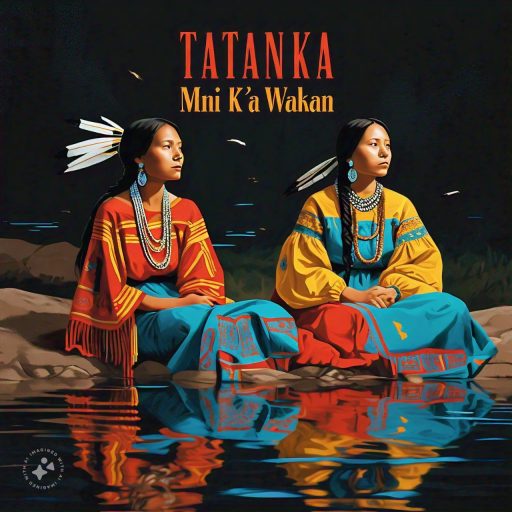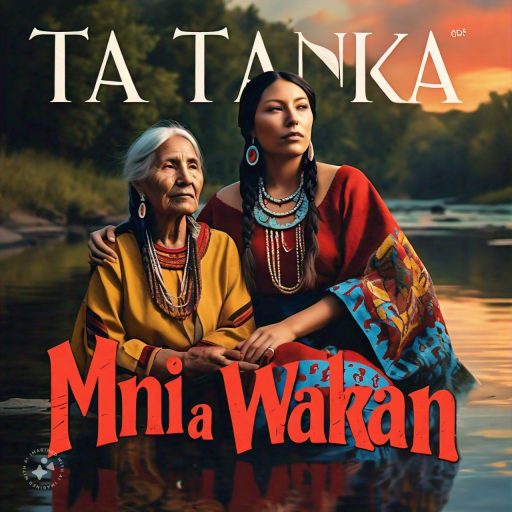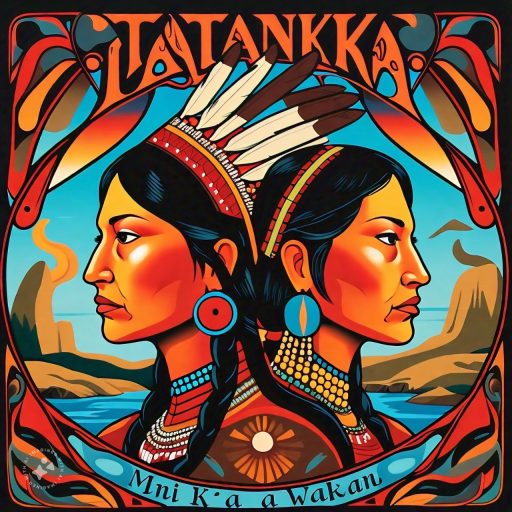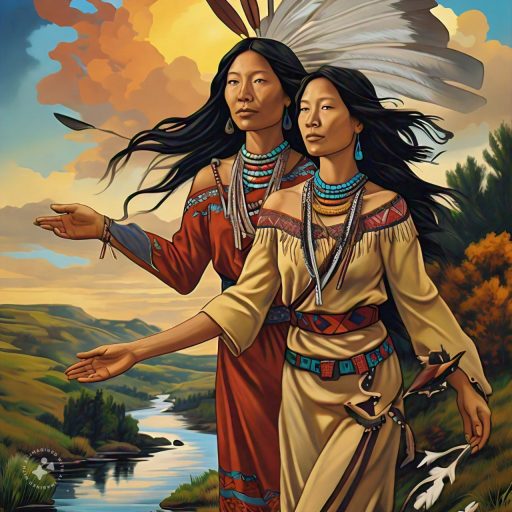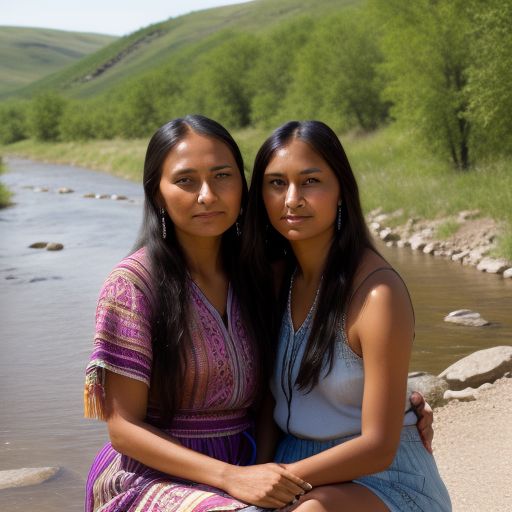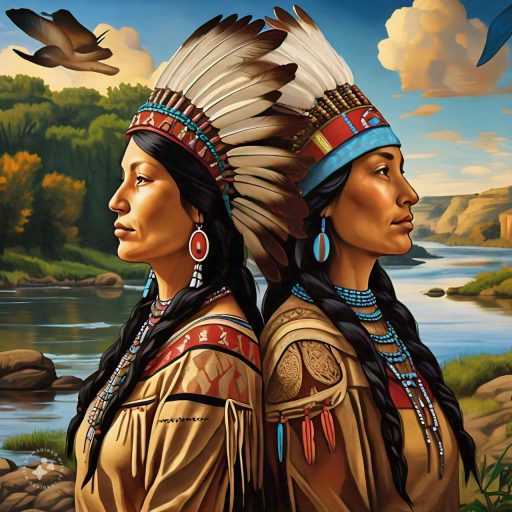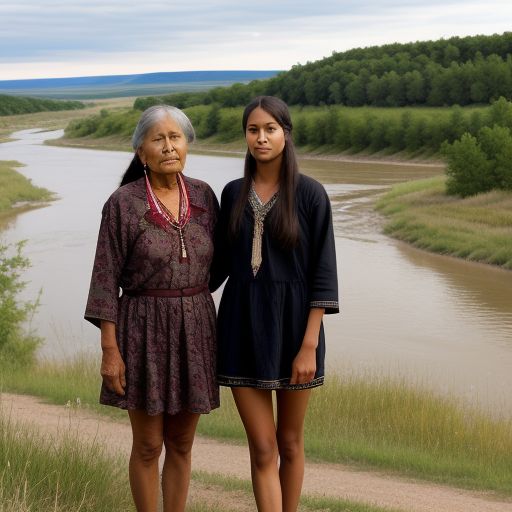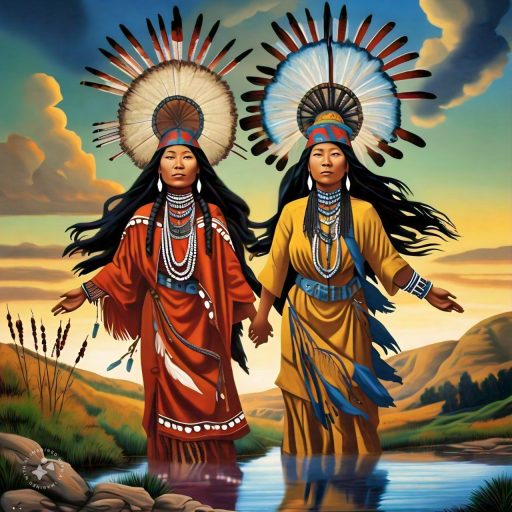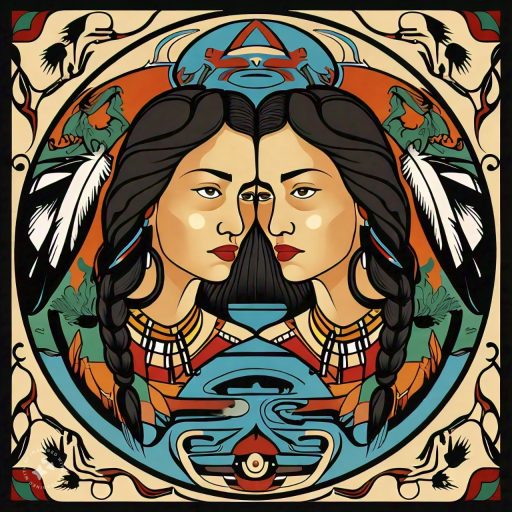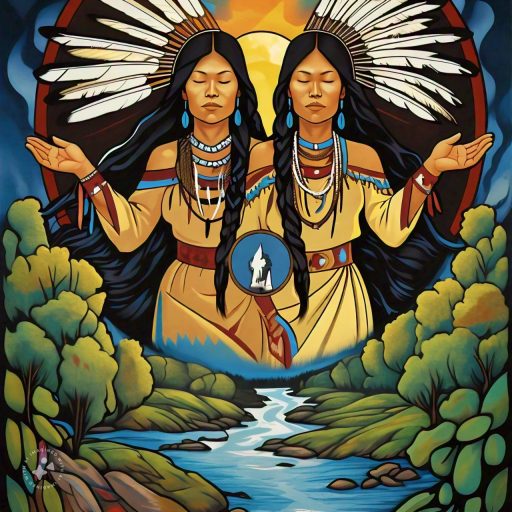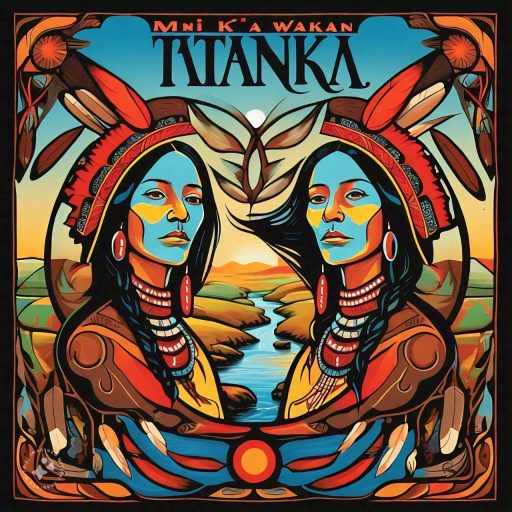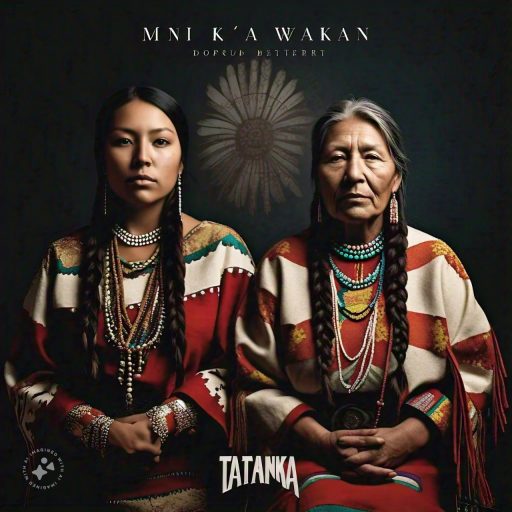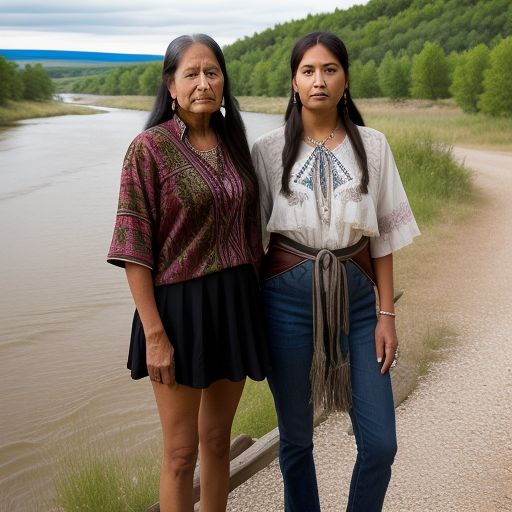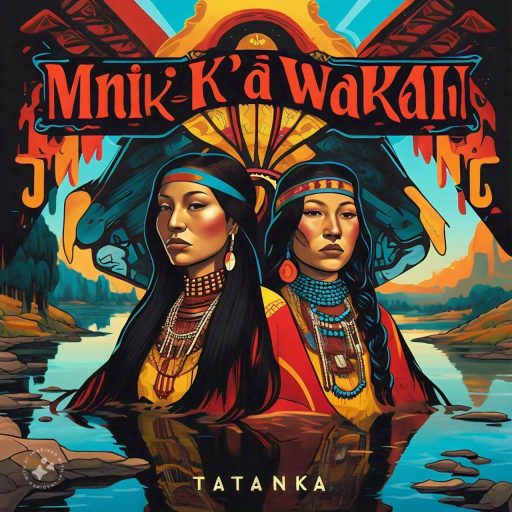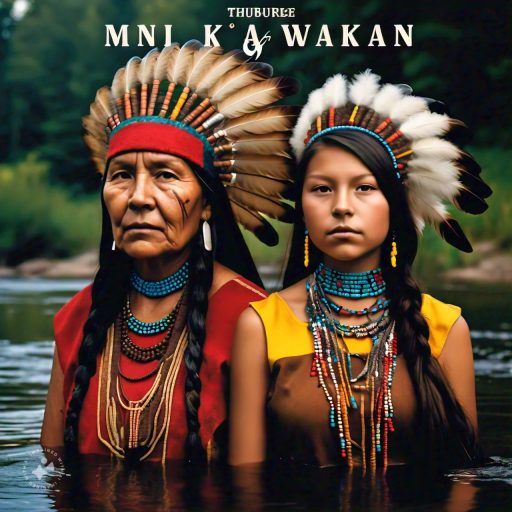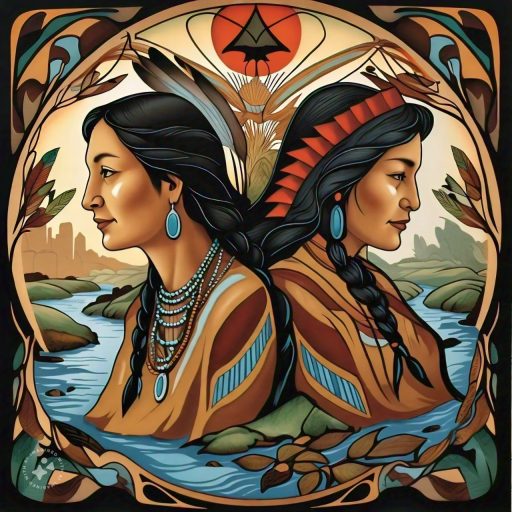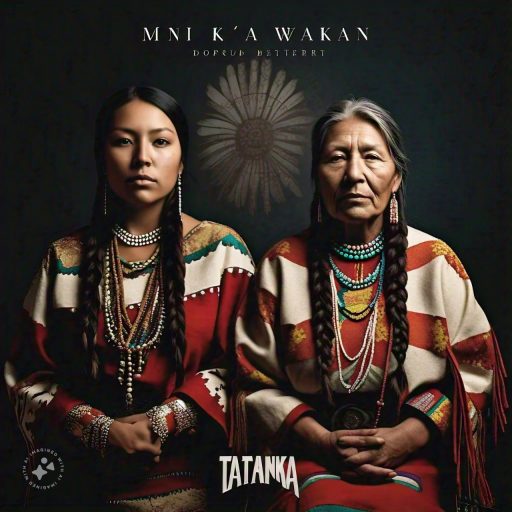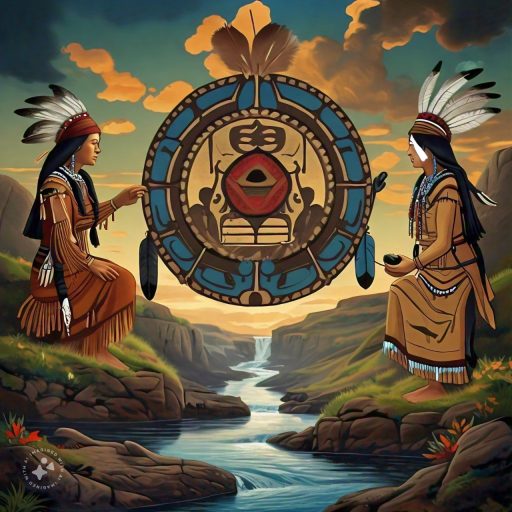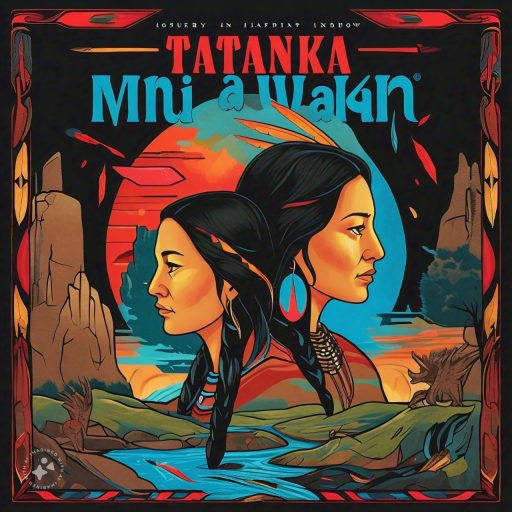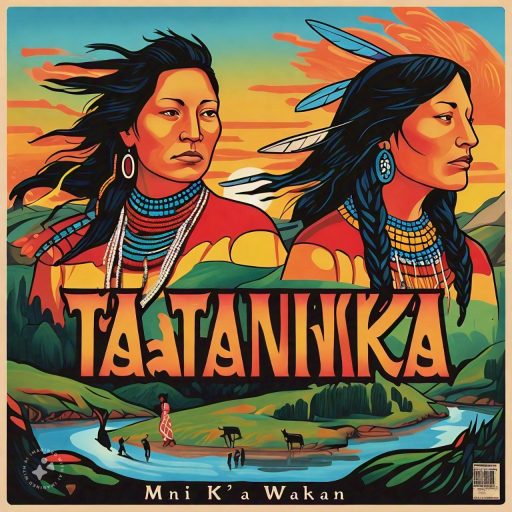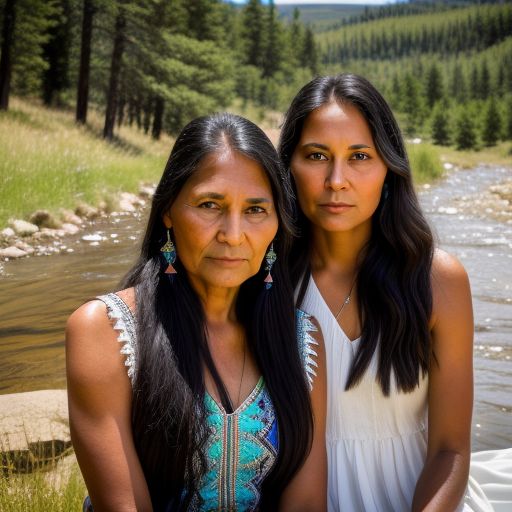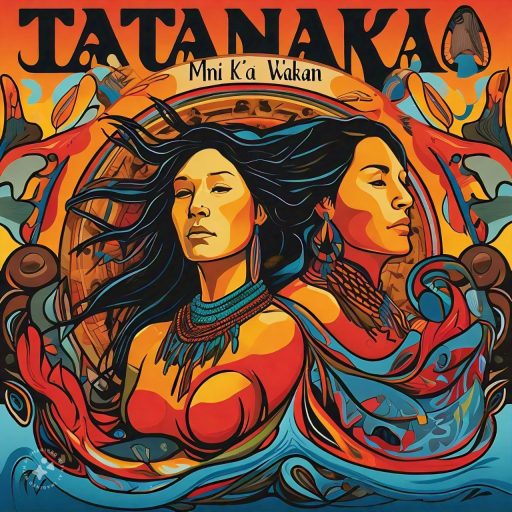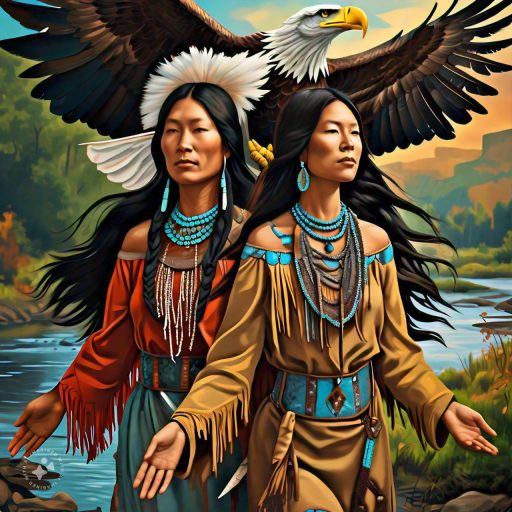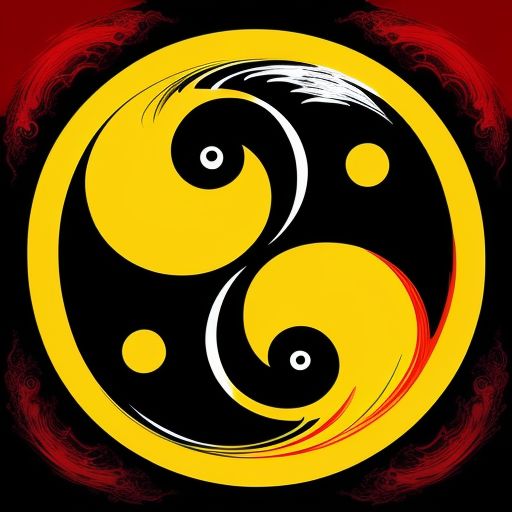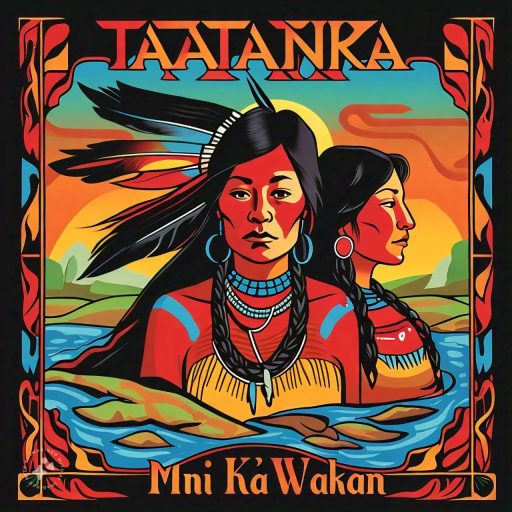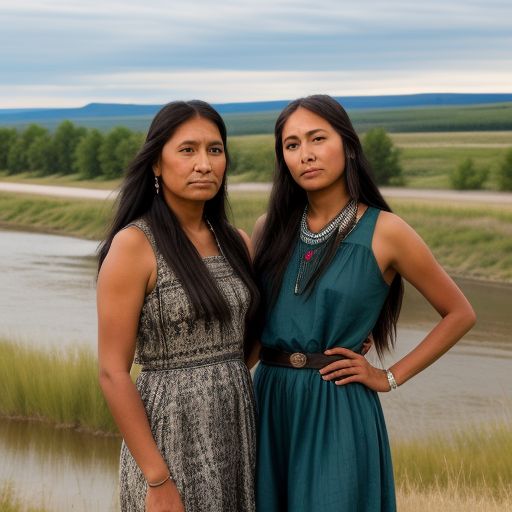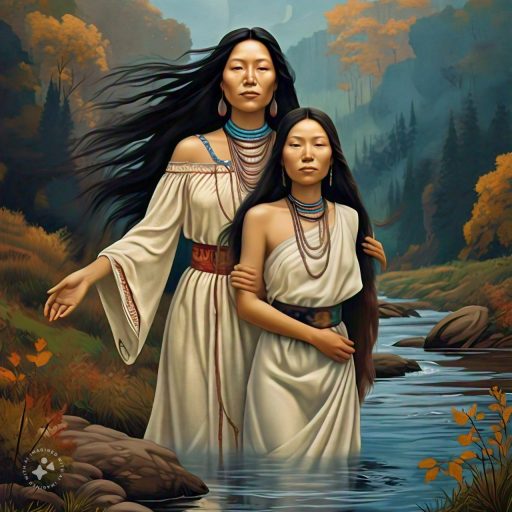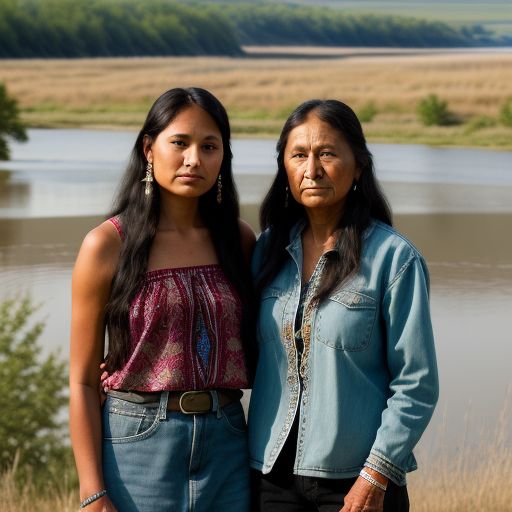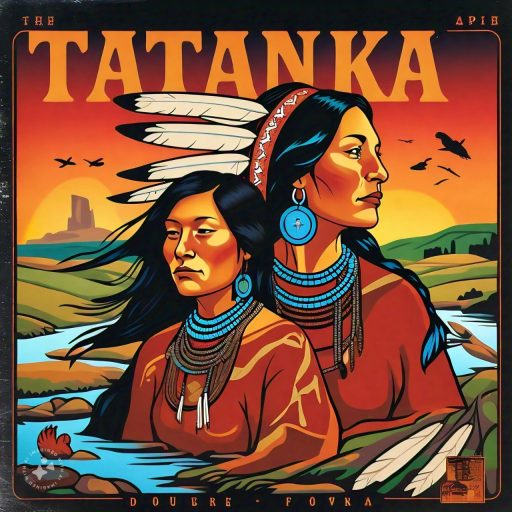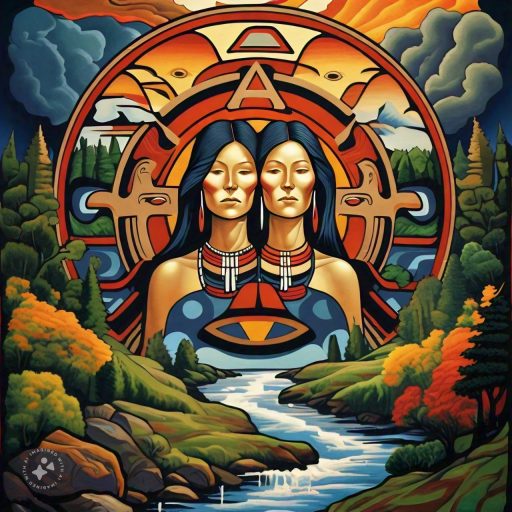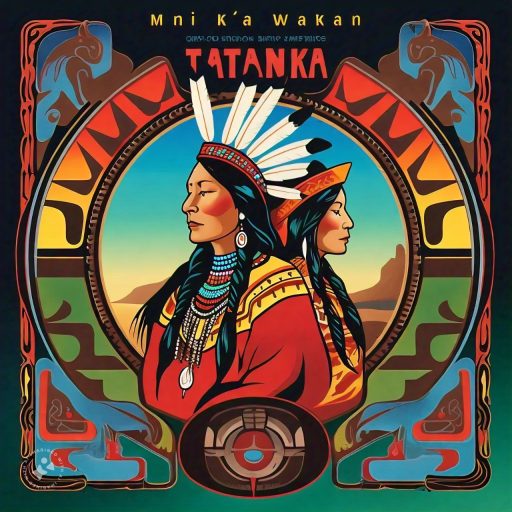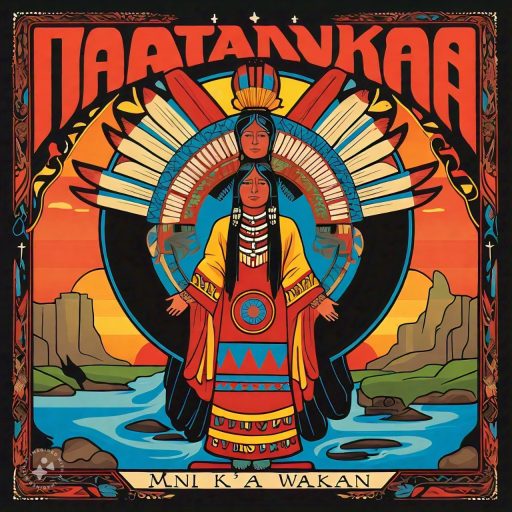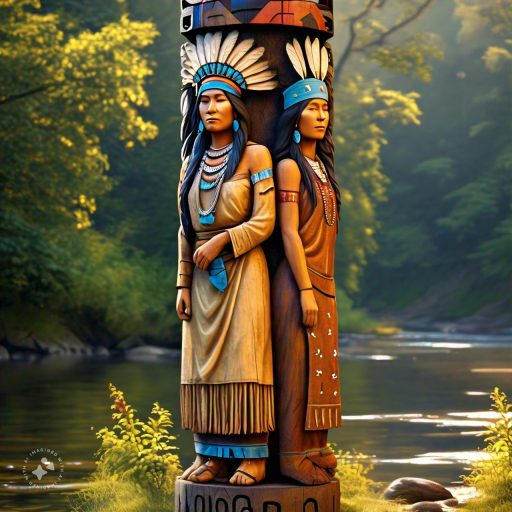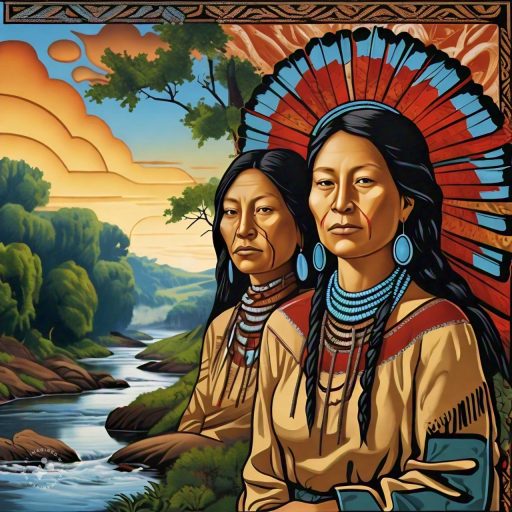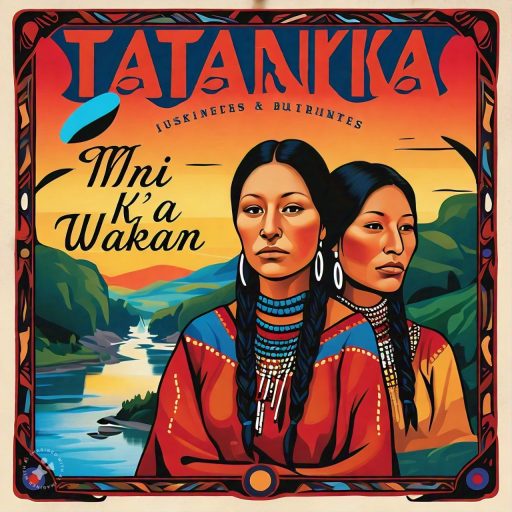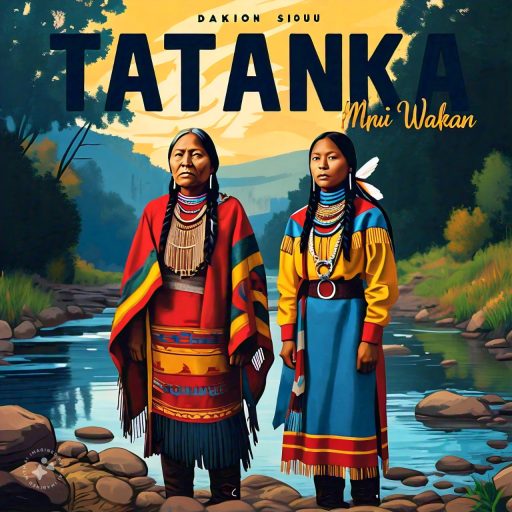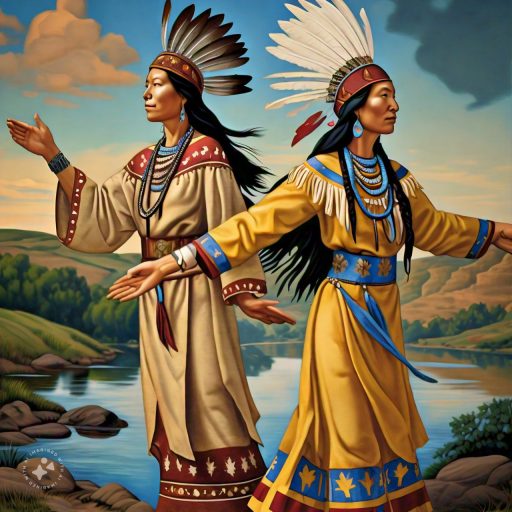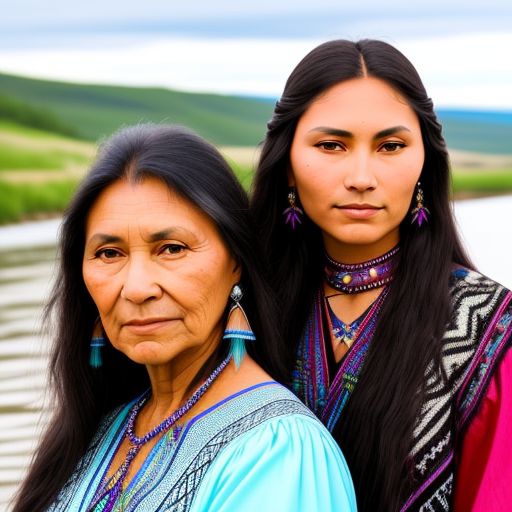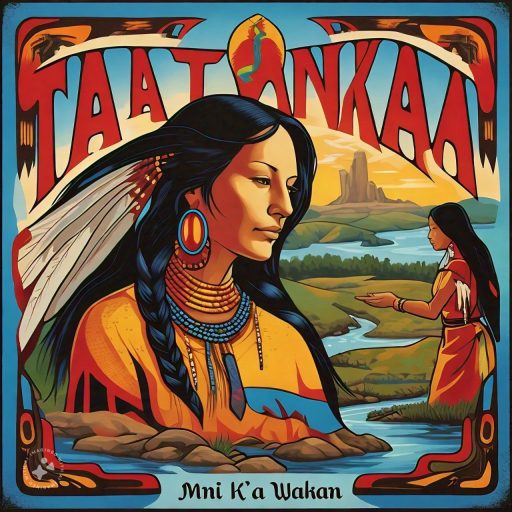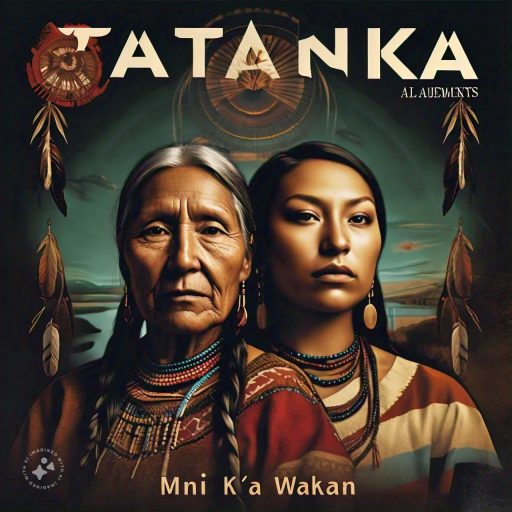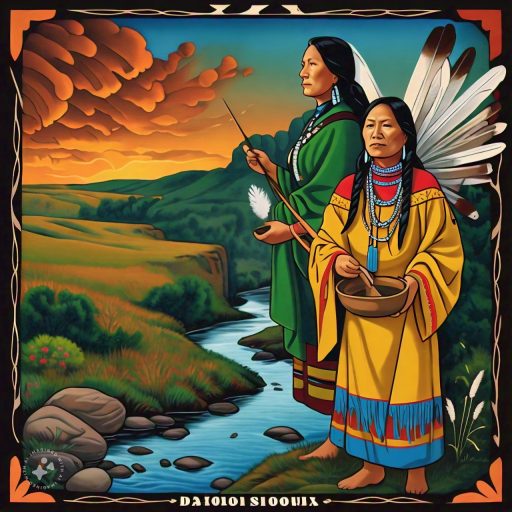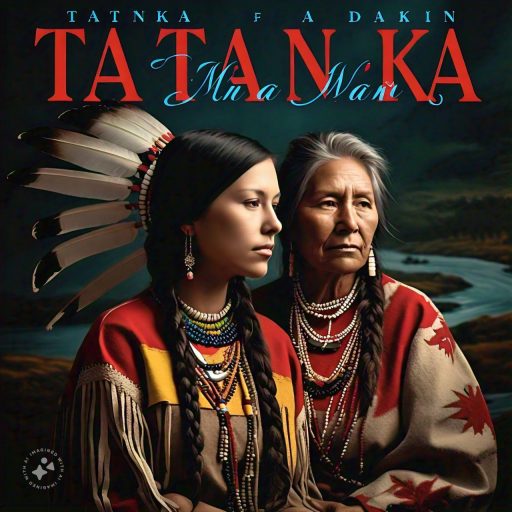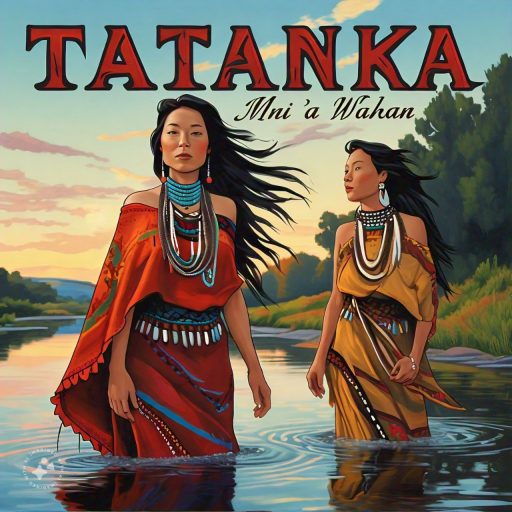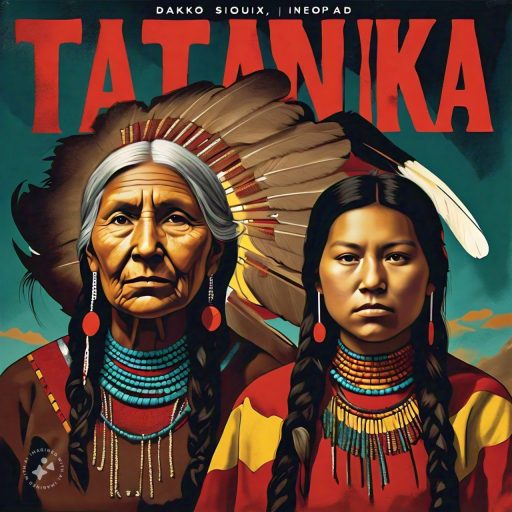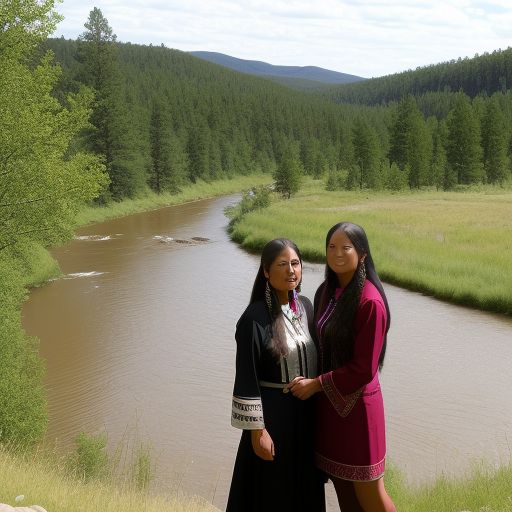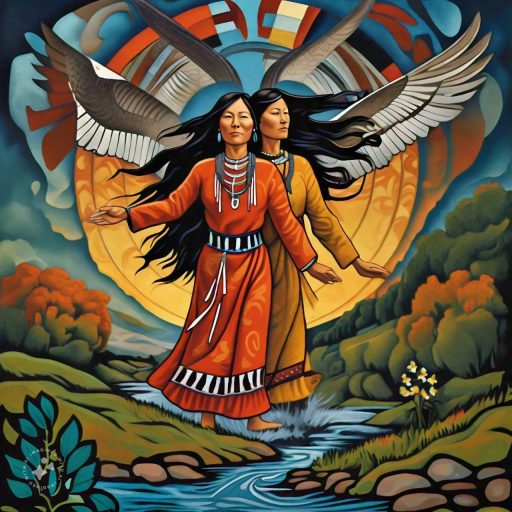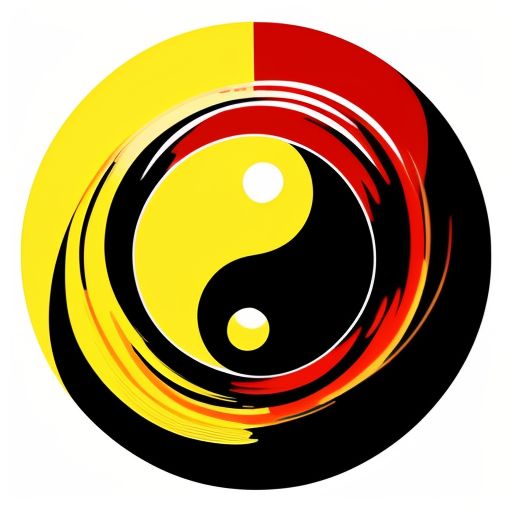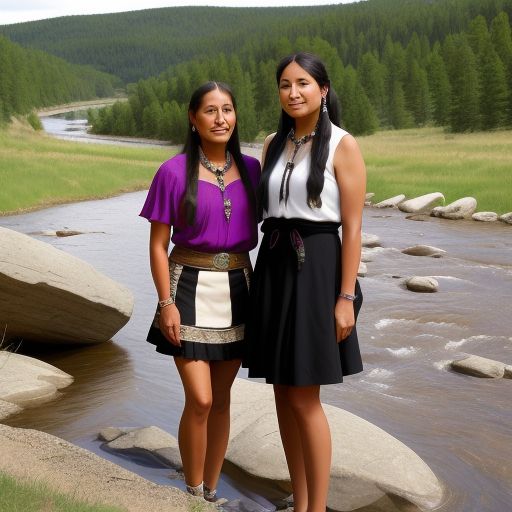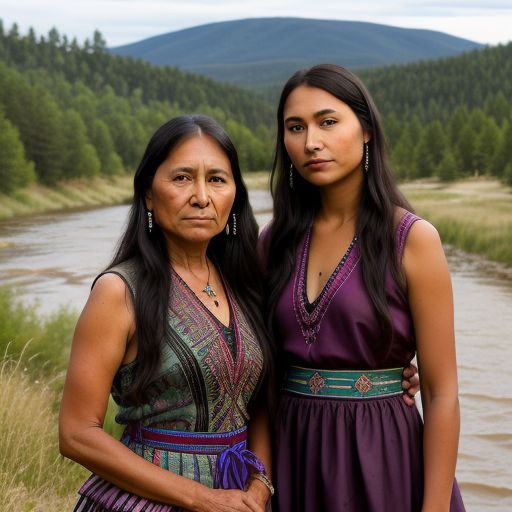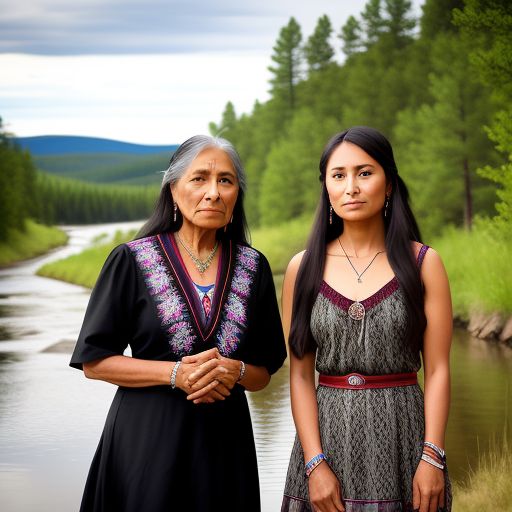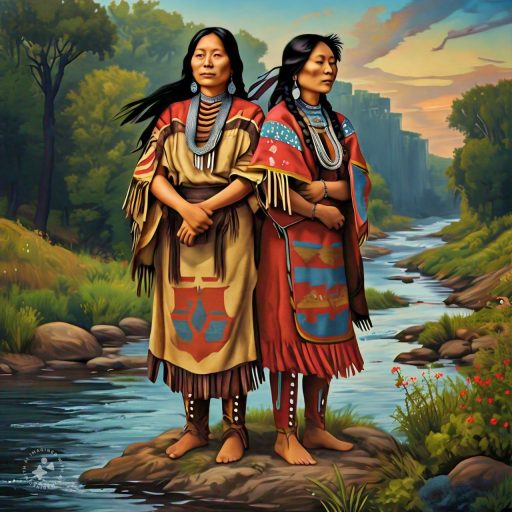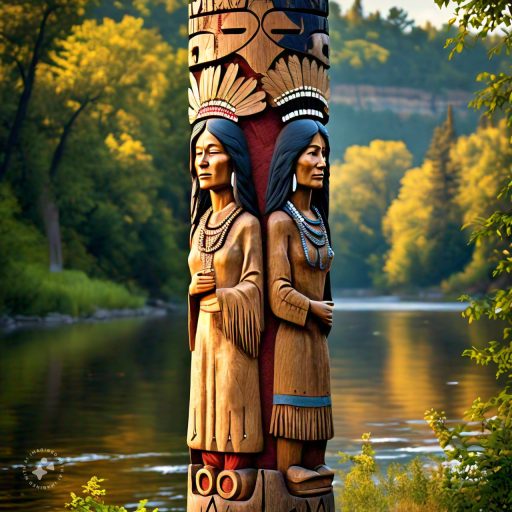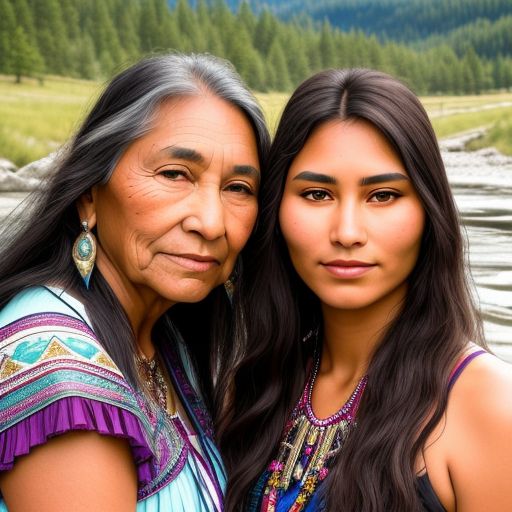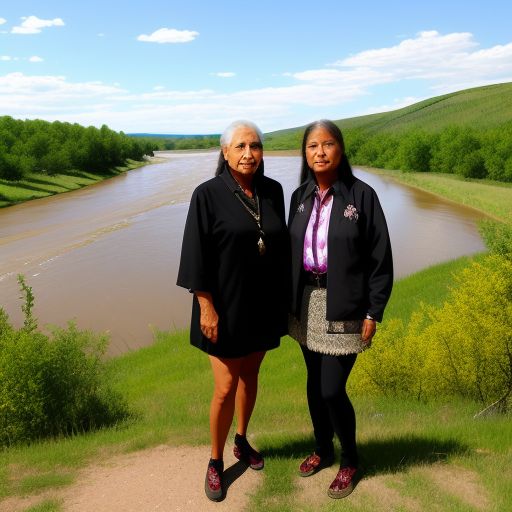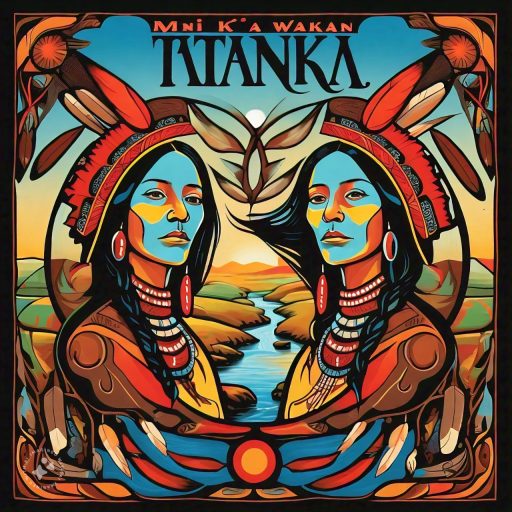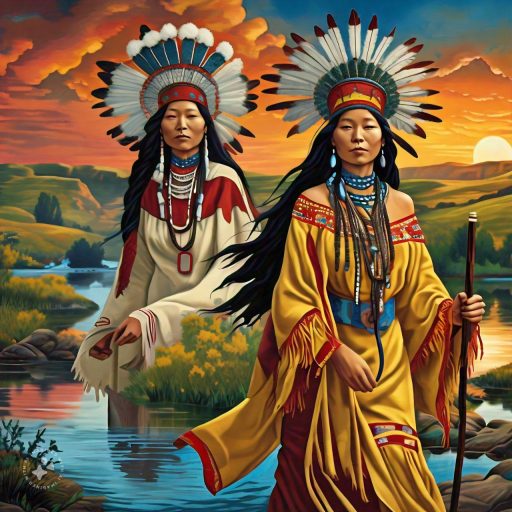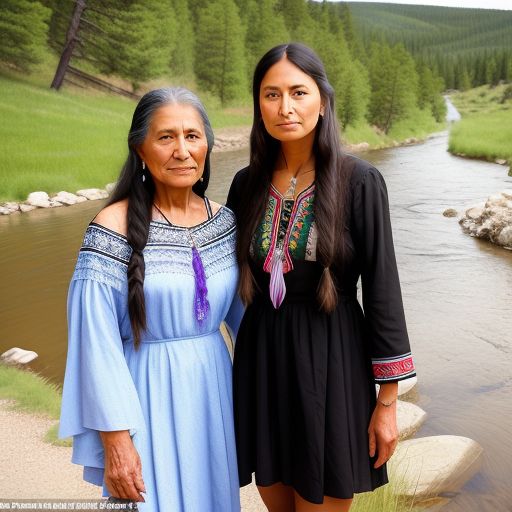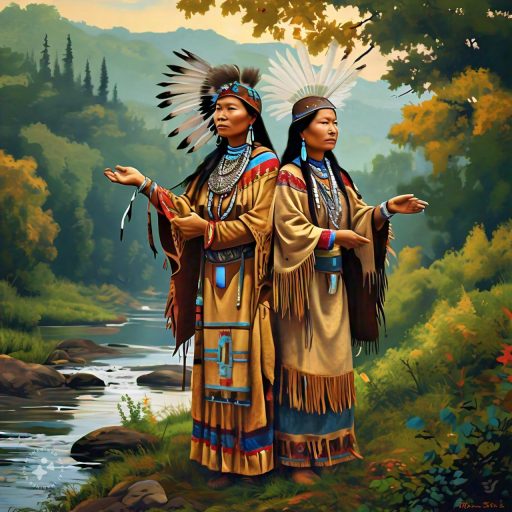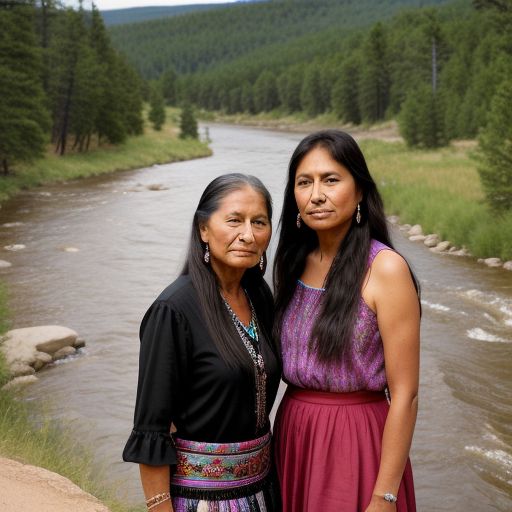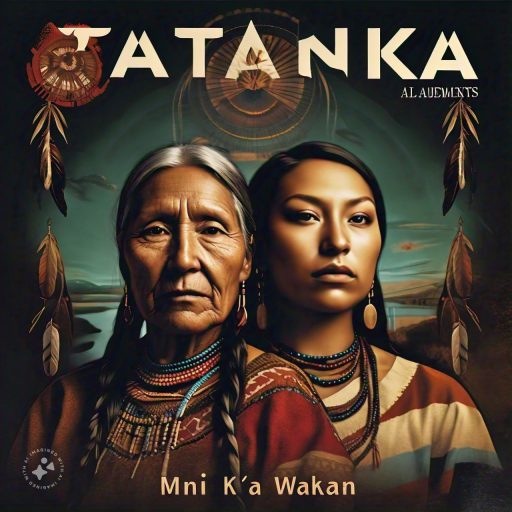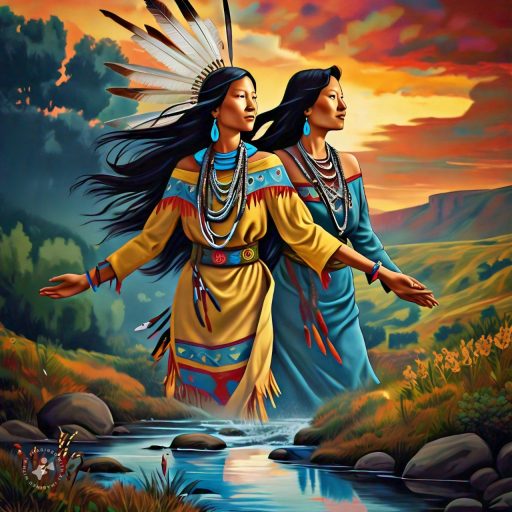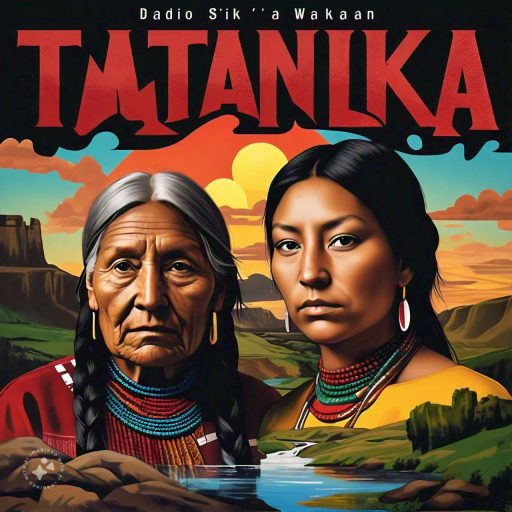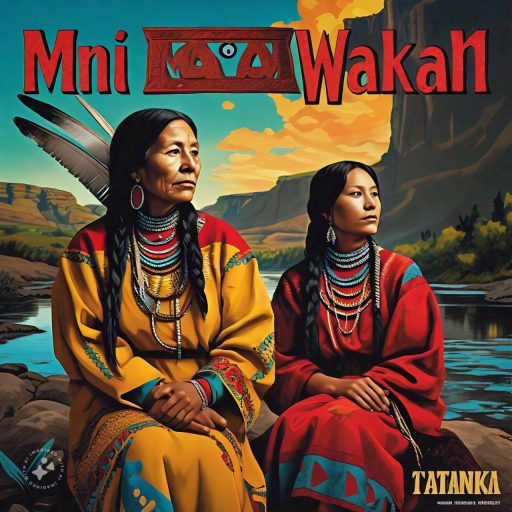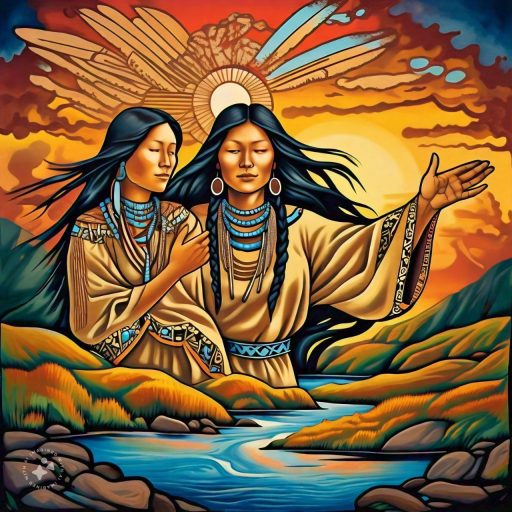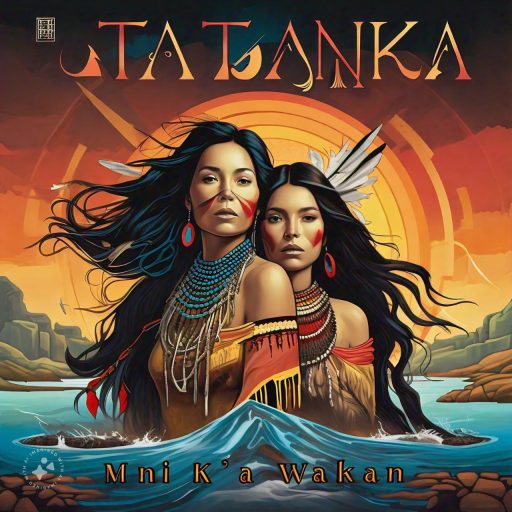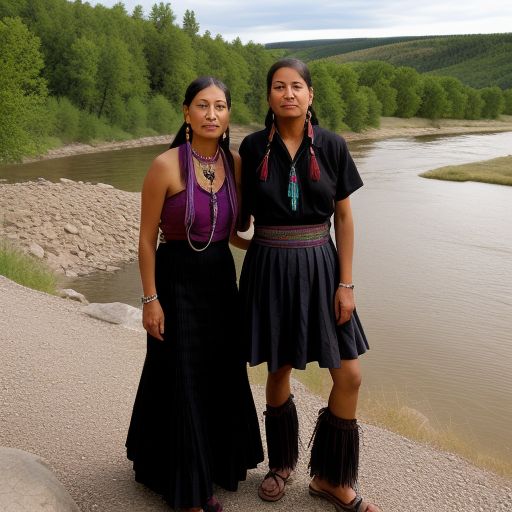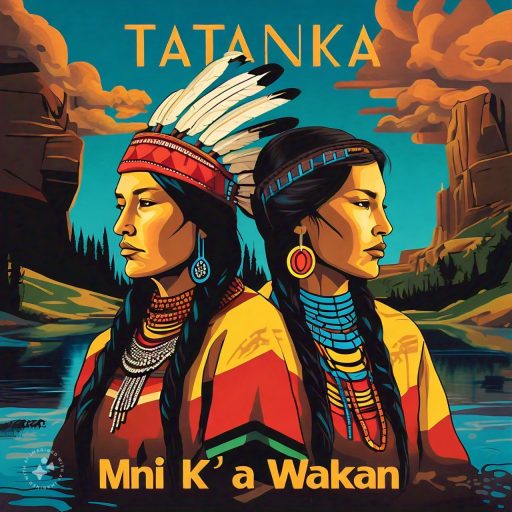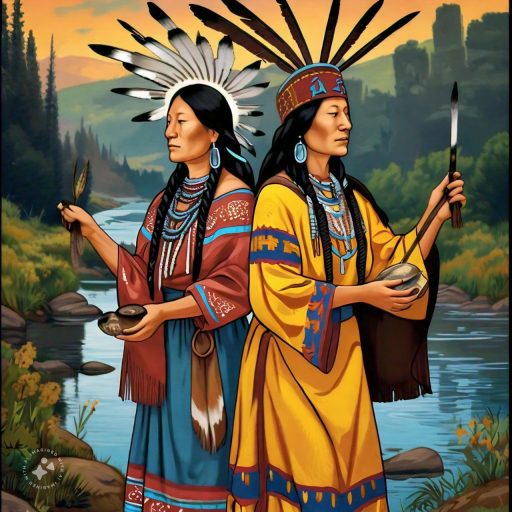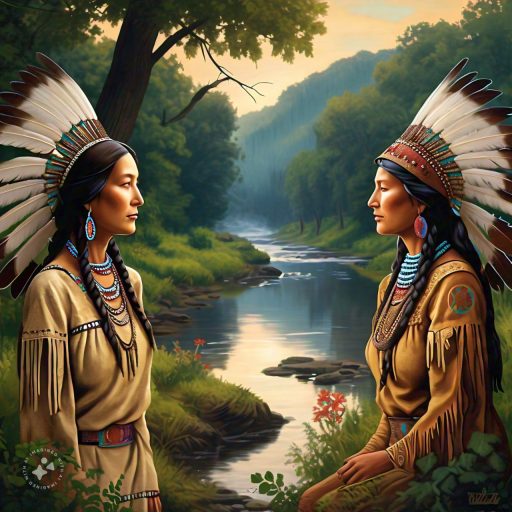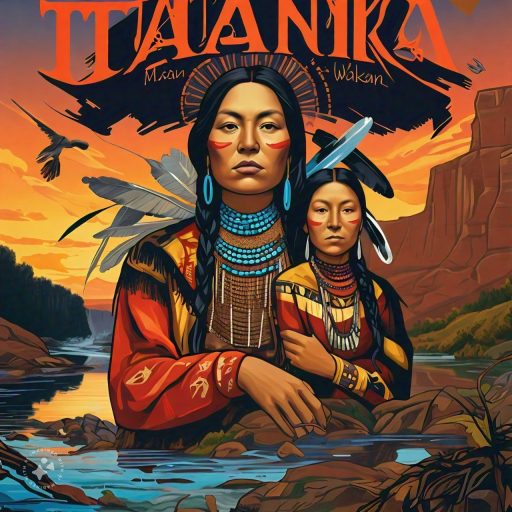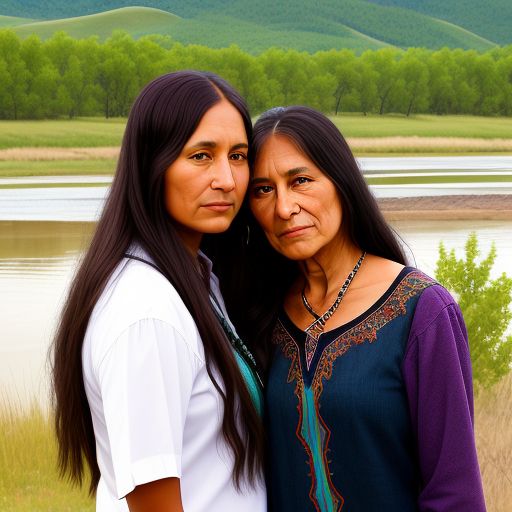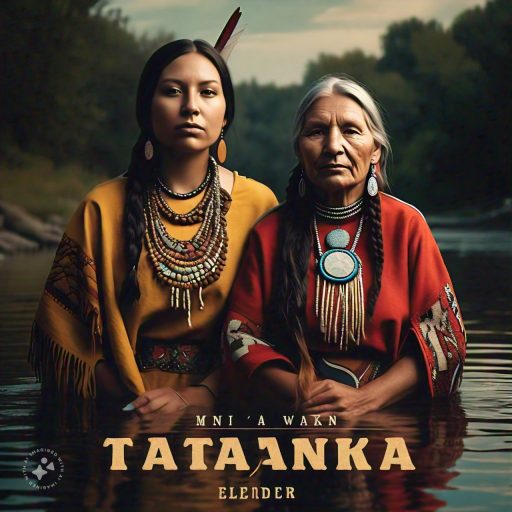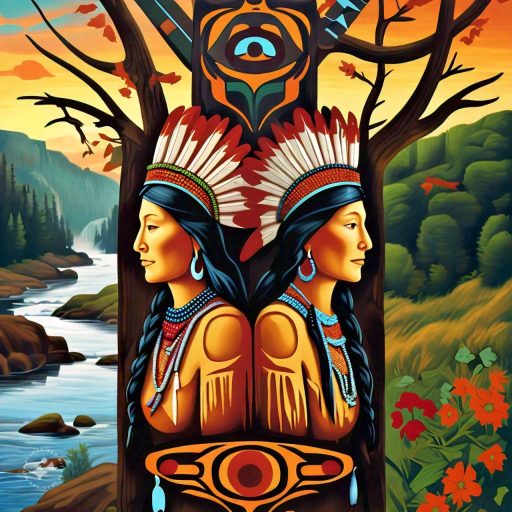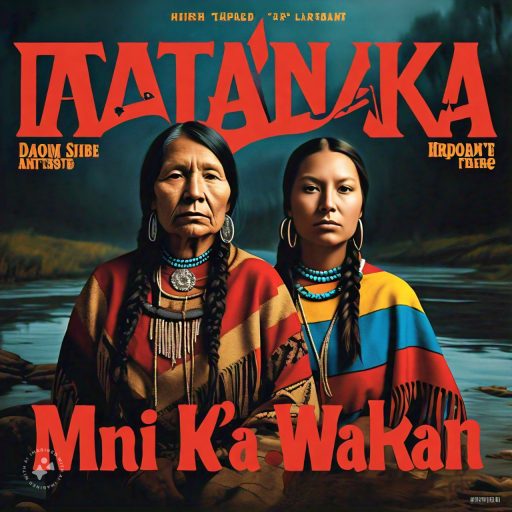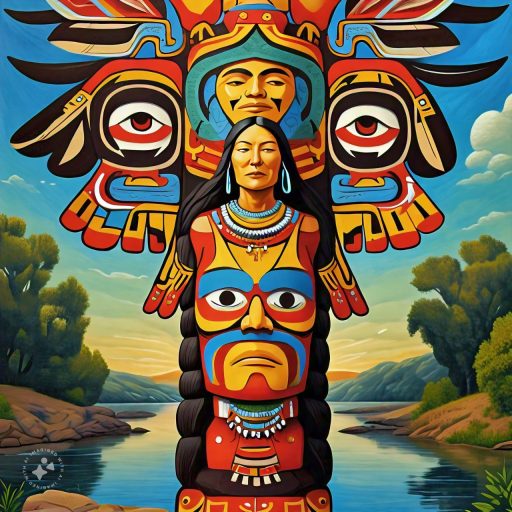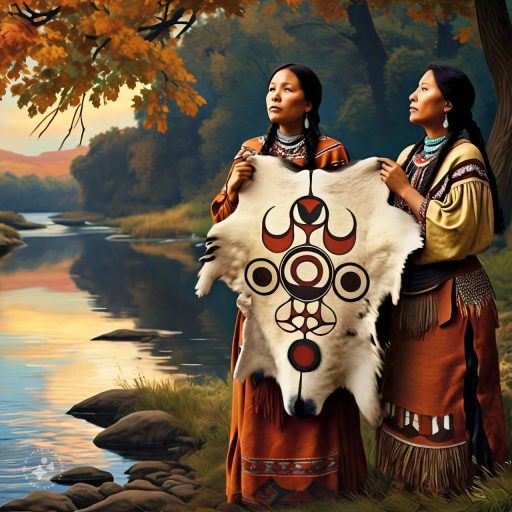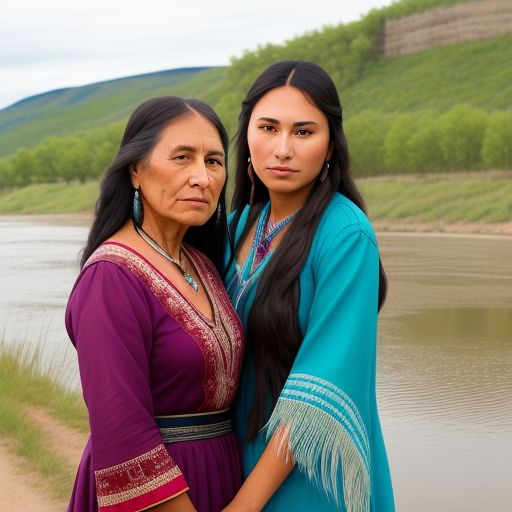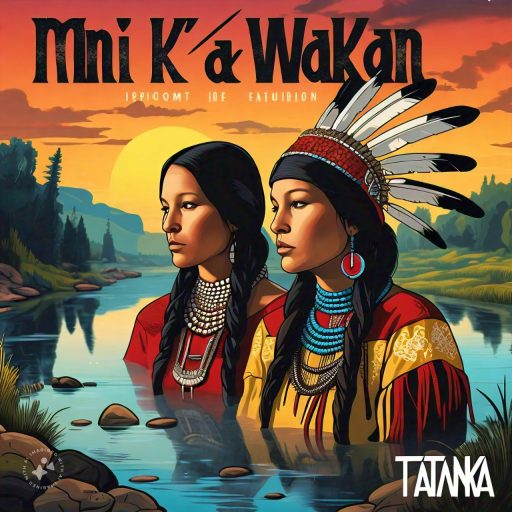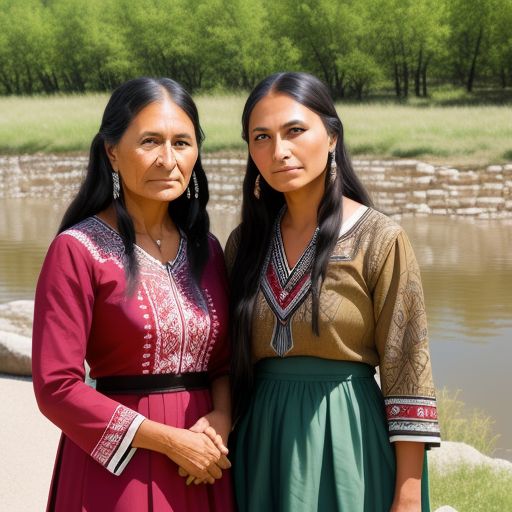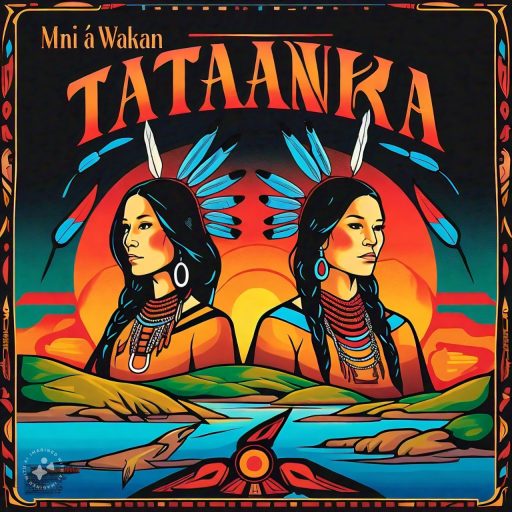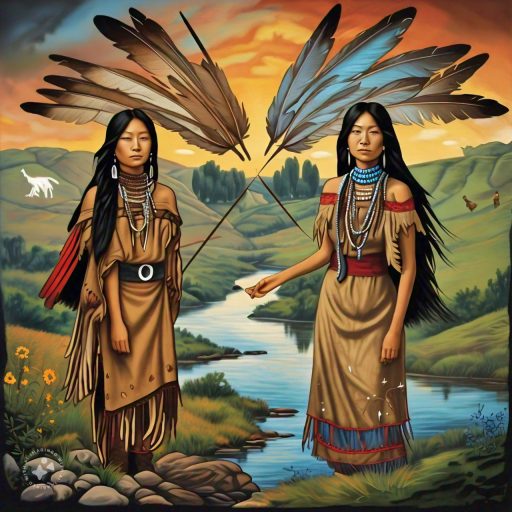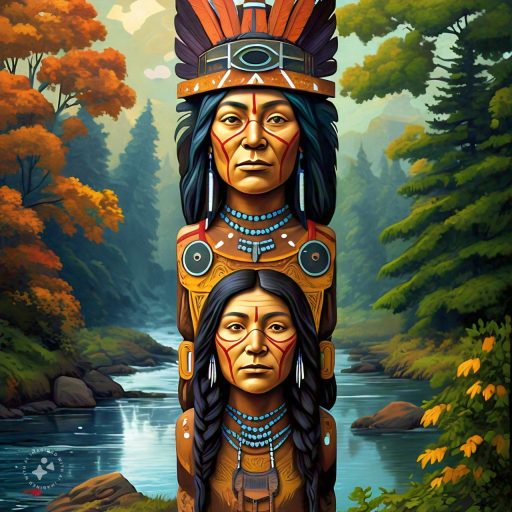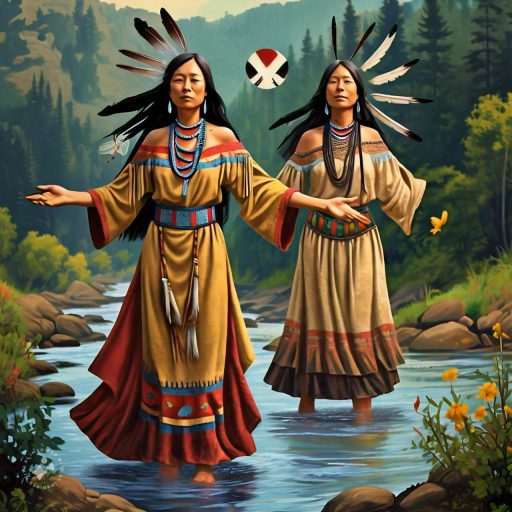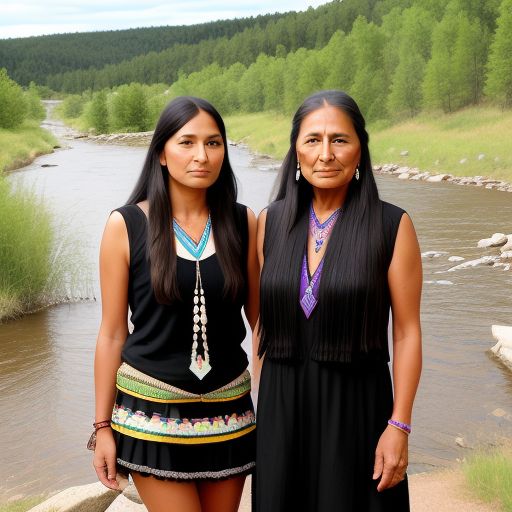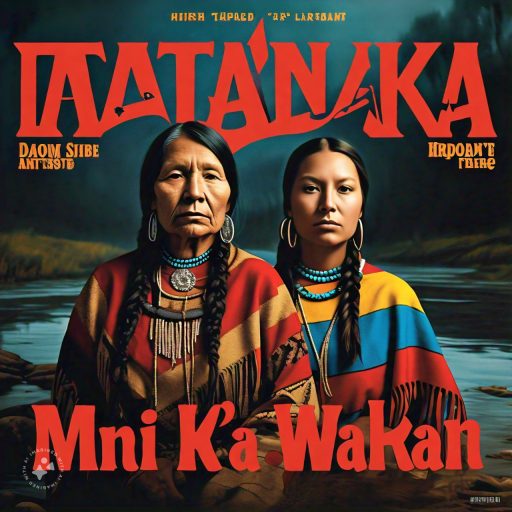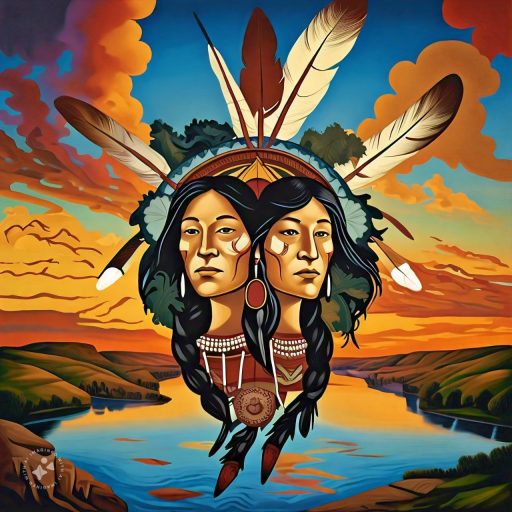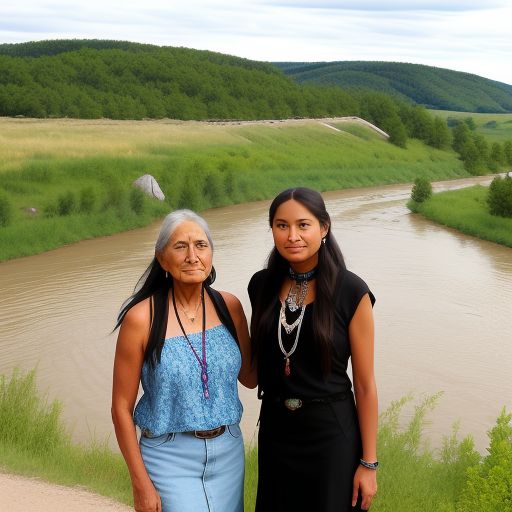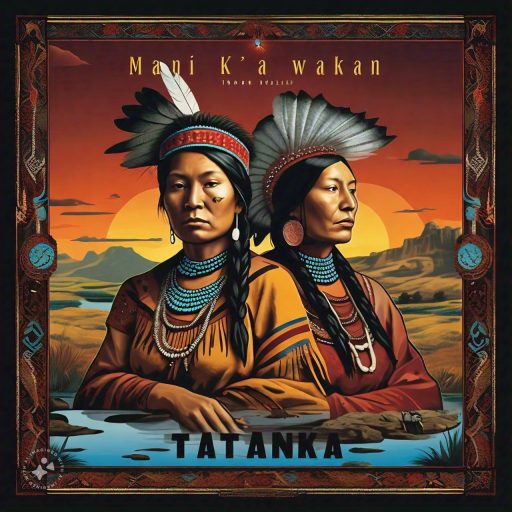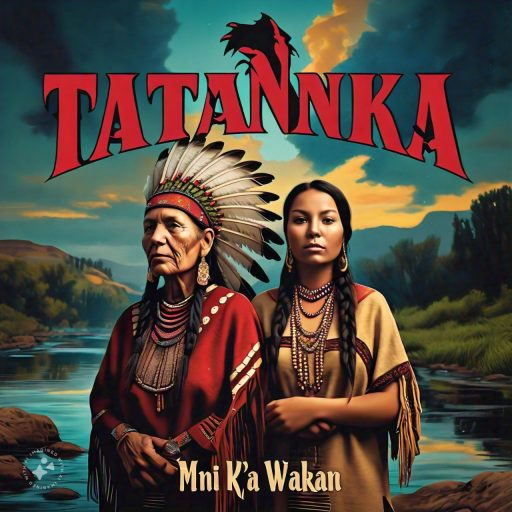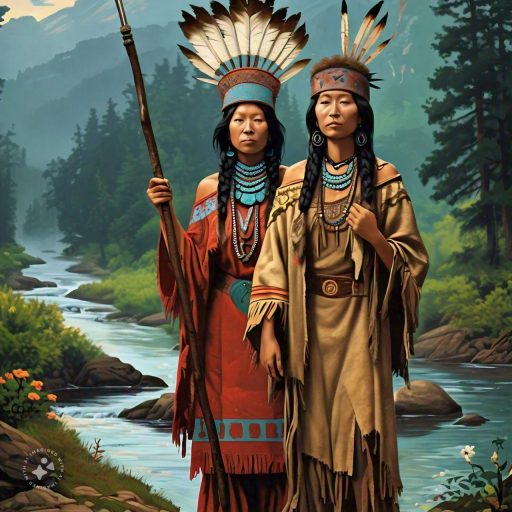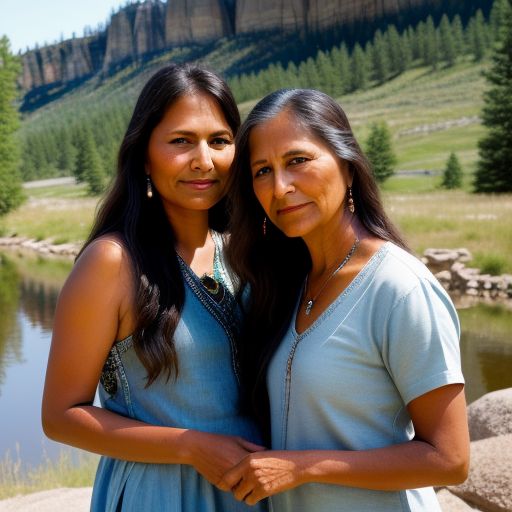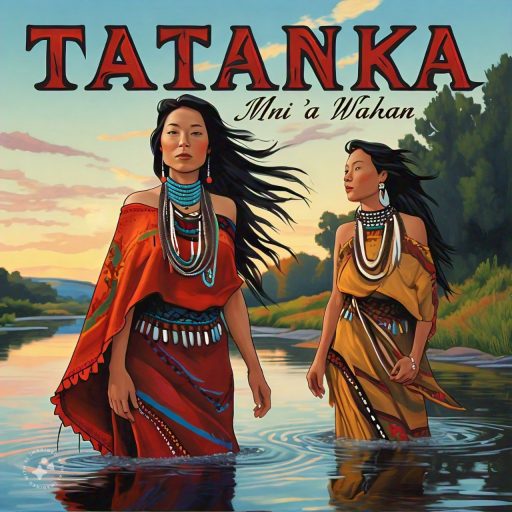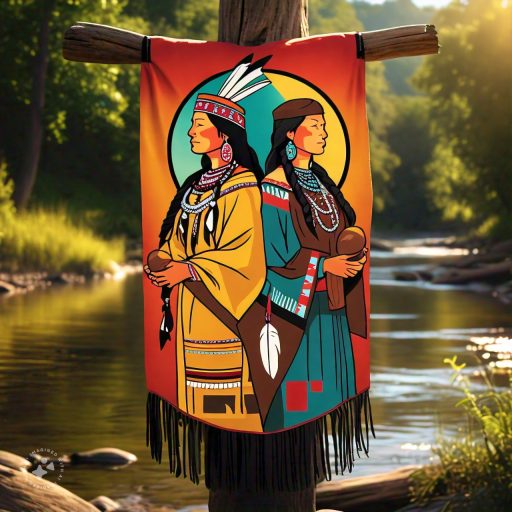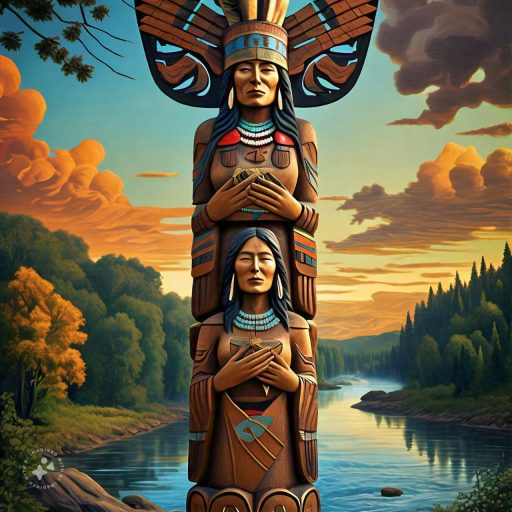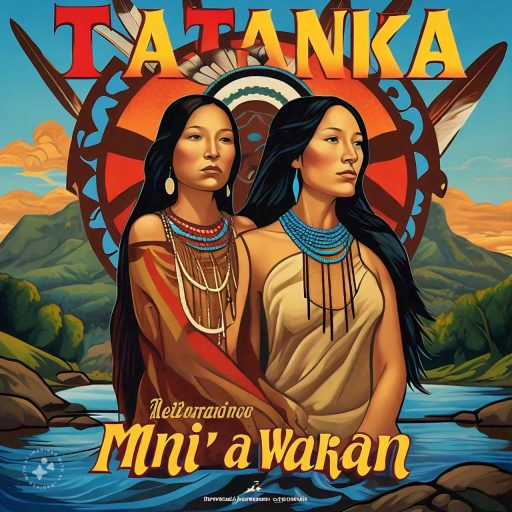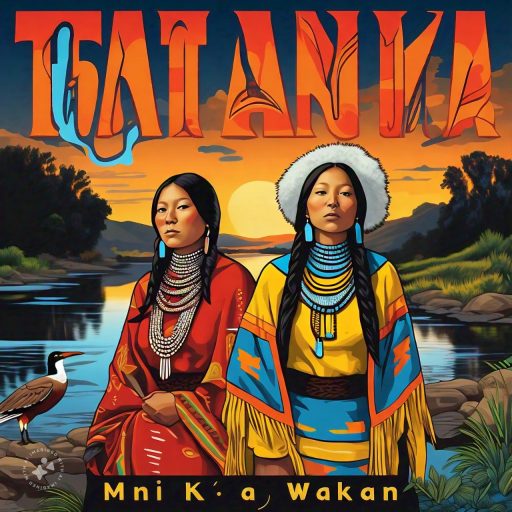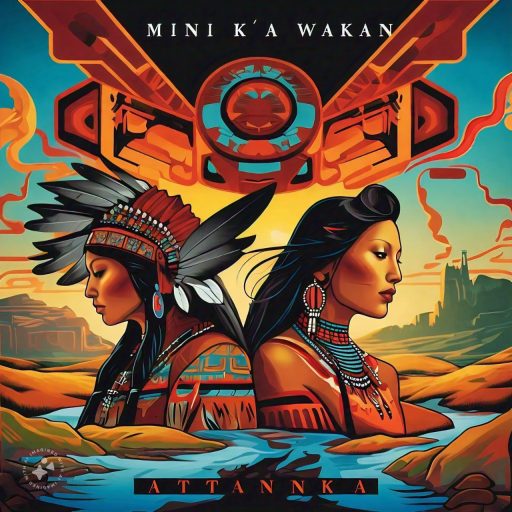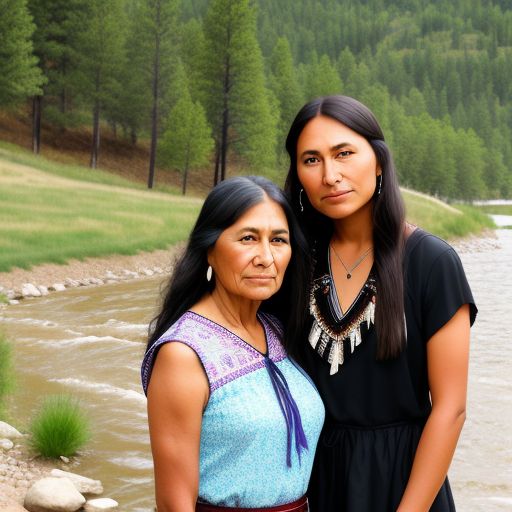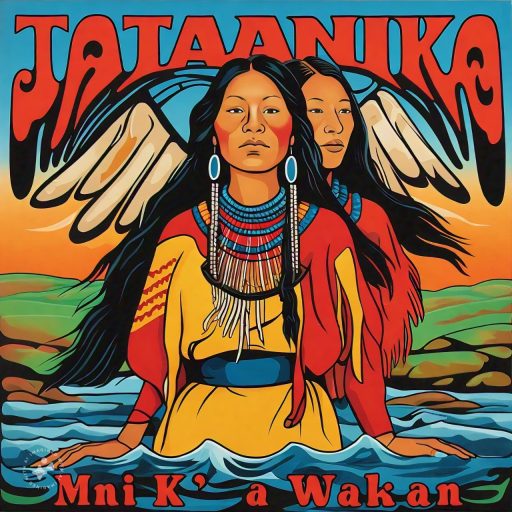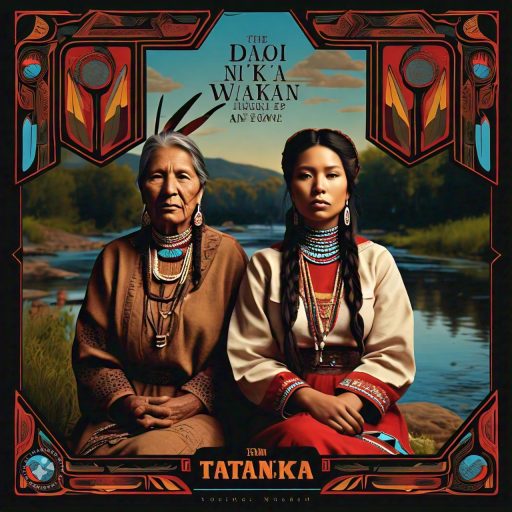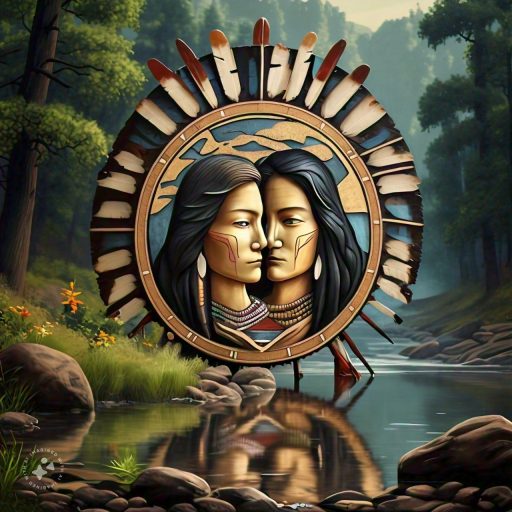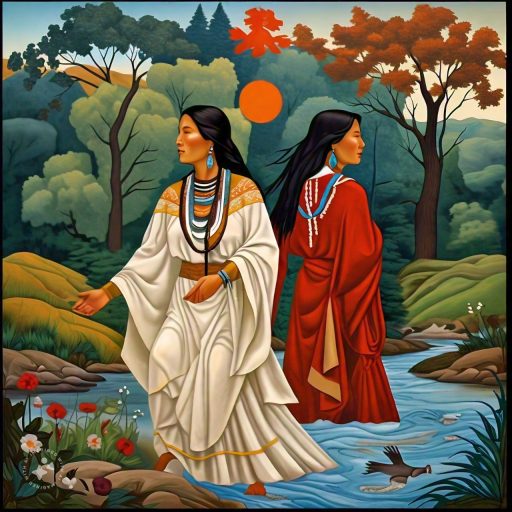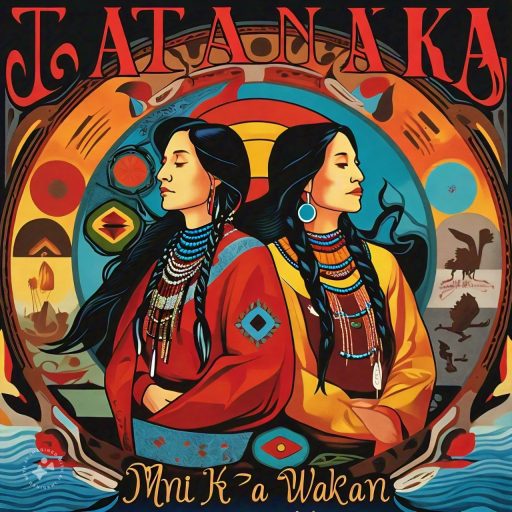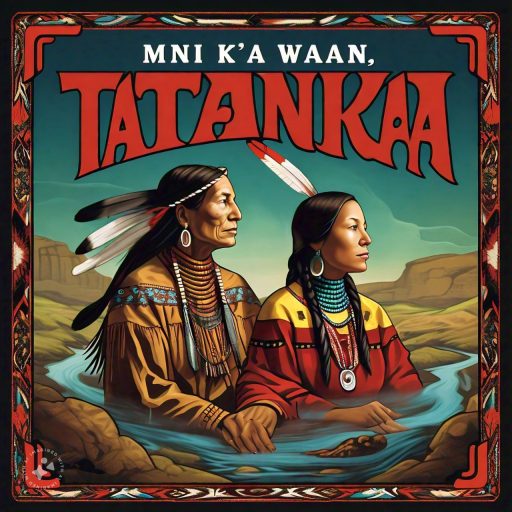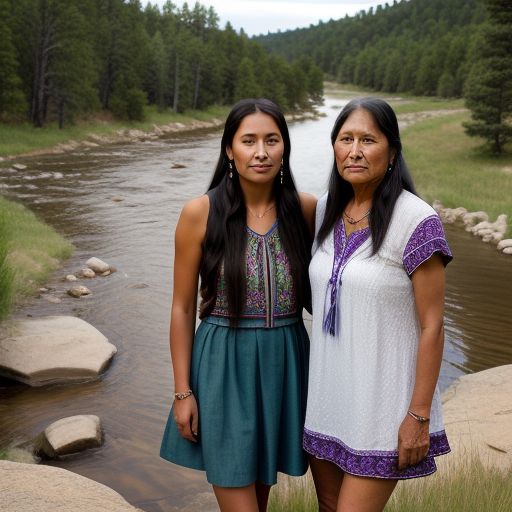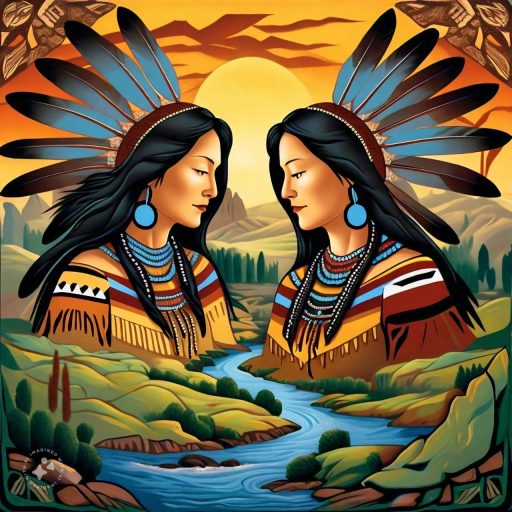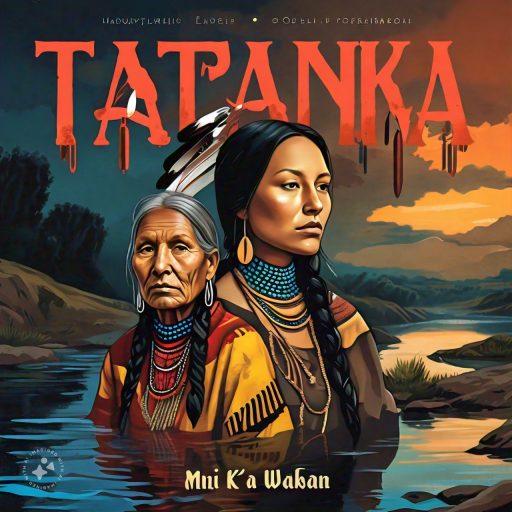Download (FREE) all Images, MP3s, FLACs:
min-ka-wakan.zip (2.99 GB)
Video Credit
Peaceful Relaxing River In The Woods | Free Stock Footage Copyright Free Sin Copyright HD
https://www.youtube.com/watch?v=zofBinqC2F4
Creator: Sound And Vision – Copyright Free Footage
https://www.youtube.com/@soundandvision1
The phrase “River of Souls” in the Native American Dakota language is “Mni K’a Wakan.” Here’s a breakdown of the phrase:
- “Mni” means “water” or “river”
- “K’a” is a possessive pronoun meaning “of” or “belonging to”
- “Wakan” means “spirit” or “soul”
“Mni K’a Wakan” can be translated to “River of Souls” or “Spirit River”. Please note that the Dakota language is complex and nuanced, and translations may vary depending on context and dialect.
Here’s a brief explanation of each album section:
- I: “Wokiksuye Wakpa” emphasizes the call to journey and the river’s significance.
- II: “Wicasa K’a Mni Kaga” highlights the struggle with memories and the descent into the unknown.
- III: “Wakan Wanbli Wakpa” marks the turning point, focusing on spiritual awakening and the river’s guidance.
- IV: “Wanbli K’a Wakan Wastewin” emphasizes the soul’s navigation and finding solace in the journey.
- V: “Mni K’a Wakpala Wanbli” brings the journey full circle, returning to the river’s edge with newfound wisdom.
Why are the tracks two versions of the same song?
The first song represents the Winúŋyaŋ (Matriarch), the second symbolizes the Wíŋyaŋ Wakȟáŋ (Storyteller) telling her story, and together they illustrate Wówaŋyaŋ (Duality).
The Double Woman: A Symbol of Balance and Harmony
In the rich cultural heritage of the Dakota Sioux, the Double Woman (also known as Anukite or Double-Faced Woman) is a revered symbol that embodies the principles of balance, harmony, and the interconnectedness of all things. This powerful icon is deeply rooted in the spiritual and philosophical traditions of the Dakota people, and its significance extends into various aspects of their culture, including music.
The Legend of the Double Woman
According to Dakota legend, the Double Woman was a spirit being with two faces, one beautiful and one ugly. She was said to have the power to control the forces of nature, particularly the winds, and was often invoked in ceremonies to ensure balance and harmony in the world. The Double Woman’s two faces represent the dualities of life, such as good and evil, light and dark, and male and female. Her presence is a reminder that these opposing forces are intertwined and inseparable.
Cultural Significance
The Double Woman symbolizes the importance of balance and harmony in all aspects of life. She teaches the Dakota people to recognize and respect the interconnectedness of all things, and to strive for equilibrium in their relationships with nature, others, and themselves. Her image is often used in ceremonies, artwork, and storytelling to convey the values of:
- Balance and harmony in the natural world
- Respect for the dualities of life
- Interconnectedness of all living things
- The importance of considering multiple perspectives
Representation in Music
In Dakota Sioux music, the Double Woman is often referenced in songs and chants that emphasize the importance of balance and harmony. These musical compositions typically feature:
- Lyrics that tell stories of the Double Woman’s power and wisdom
- Melodies that evoke a sense of balance and harmony, often using repetitive patterns and soothing rhythms
- Instrumentation that incorporates traditional Dakota instruments, such as the drum, rattle, and flute, to create a sense of connection to the natural world
- Vocal styles that blend singing and chanting, reflecting the Double Woman’s dual nature
The Double Woman’s presence in Dakota Sioux music serves as a reminder of the importance of living in harmony with the natural world and respecting the interconnectedness of all things. Her symbol continues to inspire and guide the Dakota people, promoting a deep understanding of the world and their place within it.
Synergy
The Double Woman is a powerful symbol in Dakota Sioux culture, representing the principles of balance, harmony, and interconnectedness. Her significance extends into various aspects of Dakota life, including music, where she is referenced in songs and chants that promote equilibrium and respect for the natural world. As a cultural icon, the Double Woman continues to inspire and guide the Dakota people, reminding them of the importance of living in harmony with the world around them.
Tracks
Here is the combined sequence of the sixteen songs and lyrics, each in Dakota, followed by its English translation.
01. Wokiksuye Wakpa (The Calling River)
Verse 1: Wíiyukča wíyakA, táku wíyakA,
Mní K’a wíyakA wíyakA,
WíyakA k’iŋ tȟaŋka wíyakA,
Mní wíyakA, táku k’iŋ.Verse 2: Mní tȟaŋka wíyakA, wíyakA wíiyukča,
WíyakA mní, k’iŋ tȟaŋka,
WíyakA mníčhaŋ, mní tȟaŋka,
Mní K’a wíyakA, táku wíyakA.Verse 3: Mní wíyakA, wíyakA k’iŋ,
WíyakA táku mní K’a,
Mní wíyakA, k’iŋ tȟaŋka,
Mní K’a wíyakA, tȟaŋka.Chorus: Wokiksuye, wíyakA tȟaŋka,
Mní K’a wíyakA, wíyakA,
Wokiksuye, mní k’a tȟaŋka,
Mní wíyakA, wíyakA.Bridge: Mní wíyakA tȟaŋka, wíyakA,
Wokiksuye, mní K’a wíyakA,
WíyakA tȟaŋka, mní wíyakA,
Tȟaŋka mní, wíyakA.Outro: Wokiksuye, mní wíyakA,
Tȟaŋka wíyakA, mní K’a,
Wokiksuye, mní wíyakA,
Mní K’a wíyakA, tȟaŋka.
English Translation:
Verse 1: The call of the river, it echoes clear,
The edge of the river, a voice to hear,
The great call guides, with strength it comes,
The river’s edge, where the call is from.
Verse 2: The river’s sacred call, a whispering guide,
Flowing strong, its message wide,
The river’s essence, ancient and wise,
Guiding us with its sacred ties.
Verse 3: The river’s song, strong and clear,
A call that binds, a voice sincere,
The river’s flow, a guiding light,
Leading us through the endless night.
Chorus: The Calling, the river’s strength,
The edge of the river, calling forth,
The Calling, the river’s deep voice,
The river’s edge, where echoes blend.
Bridge: The river’s call, so ancient and wise,
The Calling echoes, under the skies,
The river’s strength, guiding our way,
In its flow, we find our stay.
Outro: The Calling, the river’s song,
The edge of the river, where we belong,
The Calling, the river’s deep voice,
Guiding us, as we rejoice.
02. Mni K’a Wakpala (River’s Edge)
Verse 1: Mní k’a wakpala, táku wíyakA,
WíyakA wíiyukča mní tȟaŋka,
K’iŋ tȟaŋka wíyakA, mní sni,
WíyakA mní k’a táku wíyakA.
Chorus: Mní K’a wakpala, mní tȟaŋka,
WíyakA mní, táku wíyakA,
Mní K’a wakpala, mní sni,
K’iŋ mní tȟaŋka wíyakA.
Verse 2: Mní wíyakA, wíyakA k’iŋ tȟaŋka,
WíyakA k’iŋ tȟaŋka, mní čhaŋ,
Mní wíyakA, táku wíyakA,
Tȟaŋka wíyakA, mní k’a.
Chorus: Mní K’a wakpala, mní tȟaŋka,
WíyakA mní, táku wíyakA,
Mní K’a wakpala, mní sni,
K’iŋ mní tȟaŋka wíyakA.
Verse 3: Mní k’a wíyakA, mní čhaŋ wíyakA,
WíyakA tȟaŋka, mní K’a wíyakA,
Mní wíyakA, tȟaŋka mní,
Mní K’a wíyakA, k’iŋ mní.
Chorus: Mní K’a wakpala, mní tȟaŋka,
WíyakA mní, táku wíyakA,
Mní K’a wakpala, mní sni,
K’iŋ mní tȟaŋka wíyakA.
Bridge: Mní k’a wíyakA, wíyakA mní,
Mní K’a wakpala, mní sni,
K’iŋ mní, wíyakA tȟaŋka,
Mní wíyakA, táku wíyakA.
Chorus: Mní K’a wakpala, mní tȟaŋka,
WíyakA mní, táku wíyakA,
Mní K’a wakpala, mní sni,
K’iŋ mní tȟaŋka wíyakA.
Outro: Mní K’a wakpala, wíyakA tȟaŋka,
WíyakA mní, táku wíyakA,
Mní K’a wakpala, mní sni,
K’iŋ mní, wíyakA.
Chorus: Mní K’a wakpala, mní tȟaŋka,
WíyakA mní, táku wíyakA,
Mní K’a wakpala, mní sni,
K’iŋ mní tȟaŋka wíyakA.
Chorus: Mní K’a wakpala, mní tȟaŋka,
WíyakA mní, táku wíyakA,
Mní K’a wakpala, mní sni,
K’iŋ mní tȟaŋka wíyakA.
English Translation:
Verse 1: At the river’s edge, where whispers call,
The great river’s voice echoes wide,
The strength of its flow, pure and clear,
The river’s edge, where secrets hide.
Chorus: River’s Edge, where the strength flows,
The voice of the river, secrets untold,
River’s Edge, pure and clear,
Where the river’s strength is revealed.
Verse 2: The river’s song, a guiding force,
Its essence flows, clear and strong,
At the river’s edge, where it calls,
Strength and clarity, where we belong.
Chorus: River’s Edge, where the strength flows,
The voice of the river, secrets untold,
River’s Edge, pure and clear,
Where the river’s strength is revealed.
Verse 3: The river’s edge, where whispers blend,
The flow of strength, the call ascends,
The river’s song, clear and true,
At the river’s edge, where we renew.
Bridge: The river’s voice, guiding the way,
River’s Edge, where the echoes stay,
Strength flows, as secrets unfold,
The river’s song, timeless and bold.
Outro: River’s Edge, where strength resides,
The river’s call, where we find,
River’s Edge, pure and true,
Guiding us, as we pursue.
03. Taku Wakan Wicasa (Ancestors’ Whisper)
Verse 1: Taku wakan wicasa, wíyakA wíyakA,
WíyakA tȟaŋka k’iŋ tȟaŋka,
WíyakA k’iŋ wíyakA, wíyakA,
Taku wakan wicasa, mní sni.
Chorus: Taku wakan wicasa, wíyakA,
WíyakA tȟaŋka, tȟaŋka mní,
Taku wakan wicasa, wíyakA,
WíyakA mní k’iŋ tȟaŋka.
Verse 2: WíyakA k’iŋ mní wíyakA,
Taku wakan wicasa, k’iŋ mní,
WíyakA mní, k’iŋ wíyakA,
Taku wakan, wíyakA tȟaŋka.
Chorus: Taku wakan wicasa, wíyakA,
WíyakA tȟaŋka, tȟaŋka mní,
Taku wakan wicasa, wíyakA,
WíyakA mní k’iŋ tȟaŋka.
Verse 3: Mní wíyakA tȟaŋka, taku wakan,
WíyakA tȟaŋka, wíyakA,
Taku wakan wicasa, k’iŋ mní,
WíyakA mní k’iŋ, tȟaŋka.
Bridge: Taku wakan wicasa, mní wíyakA,
WíyakA k’iŋ, tȟaŋka, mní,
WíyakA tȟaŋka, taku wakan,
Mní k’iŋ wíyakA.
Outro: Taku wakan wicasa, wíyakA,
WíyakA tȟaŋka, mní k’iŋ,
Taku wakan wicasa, wíyakA,
Mní wíyakA, wíyakA.
English Translation:
Verse 1: The whisper of ancestors, their voice so clear,
Guiding strength, timeless and near,
Their whispers, ancient and wise,
Ancestors’ call, where their spirit lies.
Chorus: Ancestors’ Whisper, a guiding voice,
Timeless strength, in every choice,
Ancestors’ Whisper, a sacred guide,
Their wisdom flows, deep inside.
Verse 2: Their voice in the river’s flow,
Ancestors’ Whisper, a steady glow,
Their strength guides, as waters flow,
Ancestors’ wisdom, we come to know.
Chorus: Ancestors’ Whisper, a guiding voice,
Timeless strength, in every choice,
Ancestors’ Whisper, a sacred guide,
Their wisdom flows, deep inside.
Verse 3: The river’s strength, and whispers of old,
Ancestors’ voice, both gentle and bold,
Their call remains, in every stream,
Guiding us through every dream.
Bridge: Ancestors’ Whisper, their voice is near,
Guiding us through, with wisdom clear,
Their strength and knowledge, always present,
In their whispers, we find our essence.
Outro: Ancestors’ Whisper, a timeless guide,
Their strength and voice, by our side,
Ancestors’ Whisper, ever clear,
Their wisdom remains, always near.
04. Mni K’a Wakan Wicasa (Into the Current)
Verse 1: Mní k’a wakan wicasa, mní tȟaŋka,
WíyakA k’iŋ wíyakA, mní sni,
K’iŋ wíyakA, wíyakA mní,
Mní k’a wakan wicasa, wíyakA.
Chorus: Mní k’a wakan wicasa, mní tȟaŋka,
WíyakA mní, tȟaŋka k’iŋ,
Mní k’a wakan wicasa, mní sni,
K’iŋ mní tȟaŋka wíyakA.
Verse 2: WíyakA tȟaŋka, mní wíyakA,
Mní čhaŋ, k’iŋ wíyakA,
Mní tȟaŋka, wíyakA sni,
Mní k’a wakan, mní wíyakA.
Chorus: Mní k’a wakan wicasa, mní tȟaŋka,
WíyakA mní, tȟaŋka k’iŋ,
Mní k’a wakan wicasa, mní sni,
K’iŋ mní tȟaŋka wíyakA.
Verse 3: Mní wíyakA, k’iŋ mní, wíyakA,
Tȟaŋka mní, wíyakA čhaŋ,
Mní k’a wakan wicasa, tȟaŋka,
WíyakA mní, sni k’iŋ.
Chorus: Mní k’a wakan wicasa, mní tȟaŋka,
WíyakA mní, tȟaŋka k’iŋ,
Mní k’a wakan wicasa, mní sni,
K’iŋ mní tȟaŋka wíyakA.
Bridge: Mní k’a wakan, wíyakA k’iŋ,
Mní sni, tȟaŋka wíyakA,
Mní k’a wakan wicasa, mní,
WíyakA k’iŋ mní, tȟaŋka.
Chorus: Mní k’a wakan wicasa, mní tȟaŋka,
WíyakA mní, tȟaŋka k’iŋ,
Mní k’a wakan wicasa, mní sni,
K’iŋ mní tȟaŋka wíyakA.
Outro: Mní k’a wakan wicasa, wíyakA,
Mní sni, tȟaŋka wíyakA,
Mní k’a wakan wicasa, mní,
K’iŋ mní, wíyakA.
English Translation:
Verse 1: Into the sacred current, the river flows,
Guiding us through, where the strength grows,
The flow of life, pure and clear,
Into the current, where the path appears.
Chorus: Into the Current, where strength flows,
The river’s voice, where guidance shows,
Into the Current, clear and pure,
Flowing onward, ever sure.
Verse 2: The river’s strength, a guiding stream,
Its essence flows, like a dream,
Embracing the current, moving free,
Into the flow, where we are meant to be.
Chorus: Into the Current, where strength flows,
The river’s voice, where guidance shows,
Into the Current, clear and pure,
Flowing onward, ever sure.
Verse 3: The river guides, with strength and grace,
Its flow transforms, time and space,
Into the current, where we find,
The path ahead, with an open mind.
Bridge: Into the flow, where strength is found,
The current guides, with a steady sound,
Into the sacred river’s stream,
Where we follow, and live our dream.
Outro: Into the Current, where the journey lies,
Guided by the river, under open skies,
Into the Current, clear and true,
Flowing onward, as we pursue.
05. Sica Mni K’a (Shadow Waters)
Verse 1: Sica mni k’a, wíyakA tȟaŋka,
Mní wíyakA, wíyakA sni,
Mní sica, mní čhaŋ,
WíyakA tȟaŋka, sica mní.
Chorus: Sica mni k’a, mní wíyakA,
WíyakA sni, tȟaŋka mní,
Sica mni k’a, mní čhaŋ,
WíyakA sni, tȟaŋka mní.
Verse 2: Mní wíyakA, tȟaŋka mní,
Sica mní, wíyakA k’iŋ,
WíyakA mní sni,
Mní čhaŋ, sica wíyakA.
Chorus: Sica mni k’a, mní wíyakA,
WíyakA sni, tȟaŋka mní,
Sica mni k’a, mní čhaŋ,
WíyakA sni, tȟaŋka mní.
Verse 3: Mní sica, tȟaŋka wíyakA,
Sica mni, mní tȟaŋka,
WíyakA sni, mní k’a,
Tȟaŋka mní, sica wíyakA.
Bridge: Sica mni k’a, wíyakA tȟaŋka,
WíyakA sni, mní čhaŋ,
Sica mni k’a, mní wíyakA,
Mní tȟaŋka, wíyakA.
Chorus: Sica mni k’a, mní wíyakA,
WíyakA sni, tȟaŋka mní,
Sica mni k’a, mní čhaŋ,
WíyakA sni, tȟaŋka mní.
Chorus: Sica mni k’a, mní wíyakA,
WíyakA sni, tȟaŋka mní,
Sica mni k’a, mní čhaŋ,
WíyakA sni, tȟaŋka mní.
Chorus: Sica mni k’a, mní wíyakA,
WíyakA sni, tȟaŋka mní,
Sica mni k’a, mní čhaŋ,
WíyakA sni, tȟaŋka mní.
Chorus: Sica mni k’a, mní wíyakA,
WíyakA sni, tȟaŋka mní,
Sica mni k’a, mní čhaŋ,
WíyakA sni, tȟaŋka mní.
Outro: Sica mni k’a, wíyakA sni,
Mní čhaŋ, tȟaŋka wíyakA,
Sica mni k’a, mní wíyakA,
K’iŋ mní tȟaŋka.
English Translation:
Verse 1: Shadow waters, deep and dark,
Their essence whispers, silent and stark,
In the shadowed depths, the waters flow,
Guiding secrets only shadows know.
Chorus: Shadow Waters, deep and wise,
Silent streams beneath the skies,
Shadow Waters, dark and true,
In their depths, mysteries brew.
Verse 2: In the dark, the waters speak,
Shadowed depths, where secrets leak,
Silent whispers, clear and deep,
In shadow waters, where spirits sleep.
Chorus: Shadow Waters, deep and wise,
Silent streams beneath the skies,
Shadow Waters, dark and true,
In their depths, mysteries brew.
Verse 3: The dark waters, flowing still,
In shadowed depths, our fears fulfill,
Guided by the silent stream,
In shadow waters, where we dream.
Bridge: Shadow Waters, deep and still,
Silent whispers guide the will,
Shadow Waters, mysteries unfold,
In their depths, stories told.
Outro: Shadow Waters, deep and clear,
Whispers in the night we hear,
Shadow Waters, flowing true,
In their depths, we find the view.
06. Wicasa K’a Mni (Memory’s Undertow)
Verse 1: Wíčasa k’a mní, wíyakA tȟaŋka,
Mní sni, wíyakA čhaŋ,
WíyakA mní, mní čhaŋ,
Wíčasa k’a mní, tȟaŋka wíyakA.
Chorus: Wíčasa k’a mní, mní sni,
WíyakA tȟaŋka, wíyakA,
Wíčasa k’a mní, mní čhaŋ,
Tȟaŋka wíyakA, mní.
Verse 2: Mní tȟaŋka, wíyakA čhaŋ,
Wíčasa k’a, mní sni,
WíyakA mní, tȟaŋka,
Mní wíyakA, mní tȟaŋka.
Chorus: Wíčasa k’a mní, mní sni,
WíyakA tȟaŋka, wíyakA,
Wíčasa k’a mní, mní čhaŋ,
Tȟaŋka wíyakA, mní.
Verse 3: WíyakA mní, tȟaŋka čhaŋ,
Wíčasa k’a mní, sni tȟaŋka,
Mní wíyakA, mní tȟaŋka,
WíyakA sni, mní čhaŋ.
Chorus: Wíčasa k’a mní, mní sni,
WíyakA tȟaŋka, wíyakA,
Wíčasa k’a mní, mní čhaŋ,
Tȟaŋka wíyakA, mní.
Bridge: Wíčasa k’a mní, mní čhaŋ,
WíyakA tȟaŋka, mní sni,
Wíčasa k’a mní, wíyakA,
Mní tȟaŋka, sni wíyakA.
Chorus: Wíčasa k’a mní, mní sni,
WíyakA tȟaŋka, wíyakA,
Wíčasa k’a mní, mní čhaŋ,
Tȟaŋka wíyakA, mní.
Outro: Wíčasa k’a mní, mní sni,
WíyakA čhaŋ, tȟaŋka mní,
Wíčasa k’a mní, mní tȟaŋka,
WíyakA mní, mní sni.
English Translation:
Verse 1: Memory’s undertow, deep and vast,
Pulls us in, where shadows cast,
Flowing through the tides of mind,
Memory’s undertow, where we unwind.
Chorus: Memory’s Undertow, pulling deep,
Guiding us through what we keep,
Memory’s Undertow, currents strong,
In its grasp, where we belong.
Verse 2: In the depths, where memories sway,
Undertow of past, leads the way,
Memories pull with silent might,
Through the current, day and night.
Chorus: Memory’s Undertow, pulling deep,
Guiding us through what we keep,
Memory’s Undertow, currents strong,
In its grasp, where we belong.
Verse 3: The pull of memories, dark and deep,
Undertow’s strength, our souls to keep,
Guided by the shadow’s stream,
In the undertow, we find our dream.
Bridge: Memory’s Undertow, dark and deep,
Guiding us where shadows sleep,
Memory’s Undertow, strength untold,
In its grasp, our stories unfold.
Outro: Memory’s Undertow, silent and clear,
Guiding us through, near and dear,
Memory’s Undertow, strong and true,
In its depths, we find what’s due.
07. Wanbli K’a Wakan (Soul’s Navigation)
Verse 1: Wanbli k’a wakan, wíyakA sni,
Mní tȟaŋka, wíyakA,
WíyakA mní, tȟaŋka wíyakA,
Wanbli k’a wakan, wíyakA.
Chorus: Wanbli k’a wakan, mní tȟaŋka,
WíyakA sni, wíyakA,
Wanbli k’a wakan, mní sni,
Tȟaŋka wíyakA, mní.
Verse 2: WíyakA tȟaŋka, mní sni,
Wanbli k’a wakan, wíyakA,
Mní tȟaŋka, wíyakA sni,
WíyakA mní, wanbli k’a wakan.
Chorus: Wanbli k’a wakan, mní tȟaŋka,
WíyakA sni, wíyakA,
Wanbli k’a wakan, mní sni,
Tȟaŋka wíyakA, mní.
Verse 3: Mní sni, wanbli wíyakA,
WíyakA mní, tȟaŋka,
Wanbli k’a wakan, mní čhaŋ,
Tȟaŋka wíyakA, wíyakA.
Bridge: Wanbli k’a wakan, mní wíyakA,
WíyakA sni, tȟaŋka mní,
Wanbli k’a wakan, mní tȟaŋka,
WíyakA mní, tȟaŋka.
Outro: Wanbli k’a wakan, mní sni,
WíyakA tȟaŋka, mní čhaŋ,
Wanbli k’a wakan, mní,
WíyakA tȟaŋka, wíyakA.
English Translation:
Verse 1: Soul’s navigation, pure and clear,
Guiding us through what we hold dear,
In the depths, where our spirit’s free,
Soul’s navigation, guiding me.
Chorus: Soul’s Navigation, deep and wise,
Guiding us beneath the skies,
Soul’s Navigation, clear and strong,
In its path, where we belong.
Verse 2: The guiding strength, the spirit’s way,
Soul’s navigation leads the day,
Through the currents, strong and true,
In the guidance, we find what’s due.
Chorus: Soul’s Navigation, deep and wise,
Guiding us beneath the skies,
Soul’s Navigation, clear and strong,
In its path, where we belong.
Verse 3: The guiding force, within the stream,
Soul’s navigation, our guiding dream,
Through the shadows, and the light,
In the path, we find our might.
Bridge: Soul’s Navigation, through the night,
Guiding us with inner light,
Soul’s Navigation, clear and bright,
In its strength, we find our sight.
Outro: Soul’s Navigation, ever true,
Guiding us in all we do,
Soul’s Navigation, clear and free,
In its guidance, we find our key.
08. Wakan Wicasa Wanbli K’a Wasna (Purification)
Verse 1: Wakan wíčasa wanbli, mní tȟaŋka,
Mní sni, wíyakA wíyakA,
WíyakA mní, mní čhaŋ,
Wakan wíčasa wanbli, mní.
Chorus: Wakan wíčasa wanbli, mní tȟaŋka,
WíyakA sni, tȟaŋka wíyakA,
Wakan wíčasa wanbli, mní sni,
Čhaŋ wíyakA, mní tȟaŋka.
Chorus: Wakan wíčasa wanbli, mní tȟaŋka,
WíyakA sni, tȟaŋka wíyakA,
Wakan wíčasa wanbli, mní sni,
Čhaŋ wíyakA, mní tȟaŋka.
Verse 2: Mní tȟaŋka, wíyakA mní,
Wakan wíčasa, mní sni,
WíyakA tȟaŋka, mní čhaŋ,
Wakan wíčasa, wíyakA mní.
Chorus: Wakan wíčasa wanbli, mní tȟaŋka,
WíyakA sni, tȟaŋka wíyakA,
Wakan wíčasa wanbli, mní sni,
Čhaŋ wíyakA, mní tȟaŋka.
Chorus: Wakan wíčasa wanbli, mní tȟaŋka,
WíyakA sni, tȟaŋka wíyakA,
Wakan wíčasa wanbli, mní sni,
Čhaŋ wíyakA, mní tȟaŋka.
Verse 3: Mní sni, wíyakA čhaŋ,
Wakan wíčasa, mní wíyakA,
WíyakA tȟaŋka, mní tȟaŋka,
Wakan wíčasa, wíyakA.
Chorus: Wakan wíčasa wanbli, mní tȟaŋka,
WíyakA sni, tȟaŋka wíyakA,
Wakan wíčasa wanbli, mní sni,
Čhaŋ wíyakA, mní tȟaŋka.
Chorus: Wakan wíčasa wanbli, mní tȟaŋka,
WíyakA sni, tȟaŋka wíyakA,
Wakan wíčasa wanbli, mní sni,
Čhaŋ wíyakA, mní tȟaŋka.
Bridge: Wakan wíčasa wanbli, čhaŋ tȟaŋka,
WíyakA mní, wíyakA tȟaŋka,
Wakan wíčasa wanbli, mní sni,
Čhaŋ wíyakA, mní čhaŋ.
Chorus: Wakan wíčasa wanbli, mní tȟaŋka,
WíyakA sni, tȟaŋka wíyakA,
Wakan wíčasa wanbli, mní sni,
Čhaŋ wíyakA, mní tȟaŋka.
Outro: Wakan wíčasa wanbli, mní sni,
WíyakA tȟaŋka, mní tȟaŋka,
Wakan wíčasa wanbli, mní,
WíyakA mní, tȟaŋka wíyakA.
Chorus: Wakan wíčasa wanbli, mní tȟaŋka,
WíyakA sni, tȟaŋka wíyakA,
Wakan wíčasa wanbli, mní sni,
Čhaŋ wíyakA, mní tȟaŋka.
Chorus: Wakan wíčasa wanbli, mní tȟaŋka,
WíyakA sni, tȟaŋka wíyakA,
Wakan wíčasa wanbli, mní sni,
Čhaŋ wíyakA, mní tȟaŋka.
Chorus: Wakan wíčasa wanbli, mní tȟaŋka,
WíyakA sni, tȟaŋka wíyakA,
Wakan wíčasa wanbli, mní sni,
Čhaŋ wíyakA, mní tȟaŋka.
Chorus: Wakan wíčasa wanbli, mní tȟaŋka,
WíyakA sni, tȟaŋka wíyakA,
Wakan wíčasa wanbli, mní sni,
Čhaŋ wíyakA, mní tȟaŋka.
English Translation:
Verse 1: Sacred spirit’s cleansing, pure and deep,
Water flows, in silence we keep,
In the waters, where shadows fade,
Sacred spirit’s cleansing, we are made.
Chorus: Sacred spirit’s cleansing, pure and bright,
Guiding us through the darkest night,
Sacred spirit’s cleansing, free and true,
In its flow, we are renewed.
Verse 2: Pure waters, flowing strong,
Sacred cleansing, where we belong,
Guided by the sacred stream,
In its flow, we find our dream.
Chorus: Sacred spirit’s cleansing, pure and bright,
Guiding us through the darkest night,
Sacred spirit’s cleansing, free and true,
In its flow, we are renewed.
Verse 3: In the flow, the sacred light,
Cleansing waters, shining bright,
Purity found in the stream,
Sacred cleansing, our redeem.
Bridge: Sacred spirit’s cleansing, deep and clear,
Guiding us through every fear,
Sacred spirit’s cleansing, in its might,
In its path, we find our light.
Outro: Sacred spirit’s cleansing, pure and true,
Guiding us in all we do,
Sacred spirit’s cleansing, ever near,
In its waters, we hold dear.
09. Wakan Wicasa Wanbli (Spirit’s Awakening)
Verse 1: Wakan wíčasa wanbli, wíyakA čhaŋ,
WíyakA sni, tȟaŋka wíyakA,
Mní wíyakA, wíyakA,
Wakan wíčasa wanbli, mní čhaŋ.
Chorus: Wakan wíčasa wanbli, mní tȟaŋka,
WíyakA čhaŋ, wíyakA,
Wakan wíčasa wanbli, tȟaŋka sni,
Mní wíyakA, wíyakA.
Verse 2: WíyakA mní, tȟaŋka čhaŋ,
Wakan wíčasa wanbli, wíyakA,
Mní wíyakA, sni tȟaŋka,
WíyakA tȟaŋka, mní wíyakA.
Chorus: Wakan wíčasa wanbli, mní tȟaŋka,
WíyakA čhaŋ, wíyakA,
Wakan wíčasa wanbli, tȟaŋka sni,
Mní wíyakA, wíyakA.
Verse 3: Mní tȟaŋka, wíyakA sni,
Wakan wíčasa, mní čhaŋ,
WíyakA wíyakA, tȟaŋka wíyakA,
Wakan wíčasa wanbli, wíyakA.
Bridge: Wakan wíčasa wanbli, mní wíyakA,
WíyakA tȟaŋka, mní čhaŋ,
Wakan wíčasa wanbli, wíyakA,
Tȟaŋka wíyakA, mní tȟaŋka.
Outro: Wakan wíčasa wanbli, mní sni,
WíyakA tȟaŋka, mní wíyakA,
Wakan wíčasa wanbli, mní,
WíyakA wíyakA, mní čhaŋ.
English Translation:
Verse 1: Sacred spirit’s awakening, soft and clear,
Guiding through the night, we revere,
In the light, the spirit’s song,
Sacred spirit’s awakening, where we belong.
Chorus: Sacred spirit’s awakening, deep and wise,
Guiding us beneath the skies,
Sacred spirit’s awakening, ever bright,
In its light, we find our sight.
Verse 2: In the light, where spirits dance,
Sacred awakening, a new chance,
Guided by the spirit’s flow,
In its strength, we come to know.
Chorus: Sacred spirit’s awakening, deep and wise,
Guiding us beneath the skies,
Sacred spirit’s awakening, ever bright,
In its light, we find our sight.
Verse 3: In the clear, where spirits sing,
Sacred awakening, everything,
In its warmth, we find our way,
Sacred spirit guides the day.
Bridge: Sacred spirit’s awakening, shining true,
Guiding us in all we do,
Sacred spirit’s awakening, light so grand,
In its embrace, we firmly stand.
Outro: Sacred spirit’s awakening, soft and clear,
Guiding us with what we hold dear,
Sacred spirit’s awakening, ever near,
In its light, we persevere.
10. Wakan Wicasa Wanbli K’a Wakan (Vision Quest)
Verse 1: Wakan wíčasa wanbli k’a wakan,
Tȟaŋka wíyakA, wíyakA,
WíyakA mní, wíyakA,
Wakan wíčasa wanbli, čhaŋ.
Chorus: Wakan wíčasa wanbli k’a wakan,
Mní wíyakA, čhaŋ wíyakA,
Wakan wíčasa wanbli, tȟaŋka sni,
WíyakA mní, wíyakA.
Verse 2: Čhaŋ wíyakA, mní tȟaŋka,
Wakan wíčasa wanbli k’a wakan,
WíyakA tȟaŋka, mní wíyakA,
WíyakA, čhaŋ wíyakA.
Chorus: Wakan wíčasa wanbli k’a wakan,
Mní wíyakA, čhaŋ wíyakA,
Wakan wíčasa wanbli, tȟaŋka sni,
WíyakA mní, wíyakA.
Verse 3: WíyakA mní, wíyakA tȟaŋka,
Wakan wíčasa wanbli, mní sni,
Tȟaŋka wíyakA, wíyakA,
Wakan wíčasa, mní čhaŋ.
Chorus: Wakan wíčasa wanbli k’a wakan,
Mní wíyakA, čhaŋ wíyakA,
Wakan wíčasa wanbli, tȟaŋka sni,
WíyakA mní, wíyakA.
Bridge: Wakan wíčasa wanbli k’a wakan,
Čhaŋ mní, tȟaŋka wíyakA,
Wakan wíčasa wanbli, wíyakA,
Mní wíyakA, tȟaŋka.
Chorus: Wakan wíčasa wanbli k’a wakan,
Mní wíyakA, čhaŋ wíyakA,
Wakan wíčasa wanbli, tȟaŋka sni,
WíyakA mní, wíyakA.
Chorus: Wakan wíčasa wanbli k’a wakan,
Mní wíyakA, čhaŋ wíyakA,
Wakan wíčasa wanbli, tȟaŋka sni,
WíyakA mní, wíyakA.
Outro: Wakan wíčasa wanbli k’a wakan,
WíyakA mní, čhaŋ tȟaŋka,
Wakan wíčasa wanbli, mní,
WíyakA wíyakA, čhaŋ.
English Translation:
Verse 1: Sacred spirit’s vision quest, clear and bright,
Guided by the stars through the night,
In the vision, where spirits sing,
Sacred spirit’s quest, to find the meaning.
Chorus: Sacred spirit’s vision quest, pure and true,
Guiding us in what we pursue,
Sacred spirit’s quest, guiding light,
In the vision, we find our sight.
Verse 2: Guided by the light, the sacred stream,
Vision quest, fulfilling the dream,
In the clarity, where spirits play,
Guided by the vision, we find our way.
Chorus: Sacred spirit’s vision quest, pure and true,
Guiding us in what we pursue,
Sacred spirit’s quest, guiding light,
In the vision, we find our sight.
Verse 3: In the light, where visions grow,
Sacred spirit’s quest, we come to know,
Guided by the strength of the dream,
In its embrace, our spirits gleam.
Bridge: Sacred spirit’s vision quest, shining bright,
Guiding us through the sacred night,
Vision quest, our guiding star,
In its light, we find who we are.
Outro: Sacred spirit’s vision quest, ever near,
Guiding us with what we hold dear,
Vision quest, where dreams are sown,
In its light, we are shown.
11. Mni K’a Wastewin (River’s Solace)
Verse 1: Mní k’a wastewin, mní wíyakA,
WíyakA sni, wíyakA čhaŋ,
Mní tȟaŋka, mní sni,
Mní k’a wastewin, mní čhaŋ.
Chorus: Mní k’a wastewin, wíyakA tȟaŋka,
WíyakA, mní čhaŋ,
Mní k’a wastewin, mní sni,
WíyakA, mní tȟaŋka.
Verse 2: Mní wíyakA, tȟaŋka čhaŋ,
Mní sni, wíyakA,
Mní k’a wastewin, wíyakA,
WíyakA čhaŋ, mní sni.
Chorus: Mní k’a wastewin, wíyakA tȟaŋka,
WíyakA, mní čhaŋ,
Mní k’a wastewin, mní sni,
WíyakA, mní tȟaŋka.
Verse 3: WíyakA mní, mní tȟaŋka,
Mní sni, mní čhaŋ,
Mní k’a wastewin, wíyakA,
Tȟaŋka wíyakA, mní sni.
Chorus: Mní k’a wastewin, wíyakA tȟaŋka,
WíyakA, mní čhaŋ,
Mní k’a wastewin, mní sni,
WíyakA, mní tȟaŋka.
Chorus: Mní k’a wastewin, wíyakA tȟaŋka,
WíyakA, mní čhaŋ,
Mní k’a wastewin, mní sni,
WíyakA, mní tȟaŋka.
Bridge: Mní k’a wastewin, wíyakA mní,
Čhaŋ tȟaŋka, mní wíyakA,
Mní k’a wastewin, mní čhaŋ,
WíyakA mní, mní čhaŋ.
Chorus: Mní k’a wastewin, wíyakA tȟaŋka,
WíyakA, mní čhaŋ,
Mní k’a wastewin, mní sni,
WíyakA, mní tȟaŋka.
Chorus: Mní k’a wastewin, wíyakA tȟaŋka,
WíyakA, mní čhaŋ,
Mní k’a wastewin, mní sni,
WíyakA, mní tȟaŋka.
Outro: Mní k’a wastewin, mní sni,
WíyakA, mní tȟaŋka,
Mní k’a wastewin, mní,
WíyakA, mní sni.
English Translation:
Verse 1: River’s solace, peaceful and deep,
Guided by the gentle sweep,
In its calm, we find our rest,
River’s solace, at its best.
Chorus: River’s solace, deep and true,
Guiding us in all we do,
River’s solace, calm and bright,
In its peace, we find our light.
Verse 2: In the river’s calm embrace,
Finding solace in its grace,
River’s solace, pure and clear,
In its peace, we have no fear.
Chorus: River’s solace, deep and true,
Guiding us in all we do,
River’s solace, calm and bright,
In its peace, we find our light.
Verse 3: In its flow, where peace is found,
River’s solace, all around,
Guided by its gentle song,
In its embrace, we belong.
Bridge: River’s solace, softly flows,
Guiding us where peace grows,
River’s solace, deep and clear,
In its calm, we hold dear.
Outro: River’s solace, ever near,
Guiding us with what we hold dear,
River’s solace, peace we see,
In its flow, we are free.
12. Mni K’a Wakan Wanbli (River’s Rebirth)
Verse 1: Mní k’a wakan wanbli, mní tȟaŋka,
Čhaŋ wíyakA, mní wíyakA,
WíyakA sni, mní k’a,
Mní k’a wakan wanbli, mní sni.
Chorus: Mní k’a wakan wanbli, wíyakA tȟaŋka,
Mní wíyakA, čhaŋ sni,
Mní k’a wakan wanbli, mní tȟaŋka,
WíyakA, mní čhaŋ.
Verse 2: Mní wíyakA, tȟaŋka čhaŋ,
WíyakA mní, čhaŋ k’a,
Mní k’a wakan wanbli, mní sni,
Tȟaŋka wíyakA, mní wíyakA.
Chorus: Mní k’a wakan wanbli, wíyakA tȟaŋka,
Mní wíyakA, čhaŋ sni,
Mní k’a wakan wanbli, mní tȟaŋka,
WíyakA, mní čhaŋ.
Verse 3: Mní tȟaŋka, wíyakA sni,
Mní k’a wakan wanbli, čhaŋ wíyakA,
WíyakA, mní tȟaŋka,
Mní k’a, wíyakA sni.
Chorus: Mní k’a wakan wanbli, wíyakA tȟaŋka,
Mní wíyakA, čhaŋ sni,
Mní k’a wakan wanbli, mní tȟaŋka,
WíyakA, mní čhaŋ.
Chorus: Mní k’a wakan wanbli, wíyakA tȟaŋka,
Mní wíyakA, čhaŋ sni,
Mní k’a wakan wanbli, mní tȟaŋka,
WíyakA, mní čhaŋ.
Bridge: Mní k’a wakan wanbli, wíyakA mní,
Čhaŋ tȟaŋka, mní wíyakA,
Mní k’a wakan wanbli, mní sni,
WíyakA, mní čhaŋ.
Chorus: Mní k’a wakan wanbli, wíyakA tȟaŋka,
Mní wíyakA, čhaŋ sni,
Mní k’a wakan wanbli, mní tȟaŋka,
WíyakA, mní čhaŋ.
Chorus: Mní k’a wakan wanbli, wíyakA tȟaŋka,
Mní wíyakA, čhaŋ sni,
Mní k’a wakan wanbli, mní tȟaŋka,
WíyakA, mní čhaŋ.
Chorus: Mní k’a wakan wanbli, wíyakA tȟaŋka,
Mní wíyakA, čhaŋ sni,
Mní k’a wakan wanbli, mní tȟaŋka,
WíyakA, mní čhaŋ.
Chorus: Mní k’a wakan wanbli, wíyakA tȟaŋka,
Mní wíyakA, čhaŋ sni,
Mní k’a wakan wanbli, mní tȟaŋka,
WíyakA, mní čhaŋ.
Outro: Mní k’a wakan wanbli, mní sni,
WíyakA, mní tȟaŋka,
Mní k’a wakan wanbli, mní,
WíyakA, mní čhaŋ.
English Translation:
Verse 1: River’s rebirth, fresh and grand,
Guiding us with a gentle hand,
In its flow, renewal’s song,
River’s rebirth, where we belong.
Chorus: River’s rebirth, deep and true,
Guiding us in all we do,
River’s rebirth, calm and clear,
In its flow, we persevere.
Verse 2: In its grace, where life renews,
River’s song, ancient hues,
River’s rebirth, pure and bright,
In its strength, we find our light.
Chorus: River’s rebirth, deep and true,
Guiding us in all we do,
River’s rebirth, calm and clear,
In its flow, we persevere.
Verse 3: In its current, life anew,
River’s rebirth, guiding true,
In its embrace, we rise and grow,
River’s rebirth, we come to know.
Bridge: River’s rebirth, shining clear,
Guiding us to hold dear,
River’s rebirth, ever bright,
In its flow, we find our light.
Outro: River’s rebirth, near and far,
Guiding us like a guiding star,
River’s rebirth, ever near,
In its flow, we hold dear.
13. Wanbli K’a Wakan Wicasa (Soul’s Reflection)
Verse 1: Wanbli k’a wakan wíčasa, wíyakA,
Mní tȟaŋka, mní sni,
WíyakA mní, čhaŋ wíyakA,
Wanbli k’a wakan wíčasa, mní sni.
Chorus: Wanbli k’a wakan wíčasa, mní wíyakA,
Čhaŋ mní, wíyakA,
Wanbli k’a wakan wíčasa, tȟaŋka,
WíyakA mní, čhaŋ wíyakA.
Chorus: Wanbli k’a wakan wíčasa, mní wíyakA,
Čhaŋ mní, wíyakA,
Wanbli k’a wakan wíčasa, tȟaŋka,
WíyakA mní, čhaŋ wíyakA.
Verse 2: Mní wíyakA, wíyakA tȟaŋka,
Wanbli k’a wakan, mní sni,
WíyakA čhaŋ, mní tȟaŋka,
Wanbli k’a wakan wíčasa, mní čhaŋ.
Chorus: Wanbli k’a wakan wíčasa, mní wíyakA,
Čhaŋ mní, wíyakA,
Wanbli k’a wakan wíčasa, tȟaŋka,
WíyakA mní, čhaŋ wíyakA.
Chorus: Wanbli k’a wakan wíčasa, mní wíyakA,
Čhaŋ mní, wíyakA,
Wanbli k’a wakan wíčasa, tȟaŋka,
WíyakA mní, čhaŋ wíyakA.
Verse 3: Mní tȟaŋka, wíyakA mní,
Čhaŋ wanbli, mní čhaŋ,
WíyakA mní, wíyakA sni,
Wanbli k’a wakan, mní tȟaŋka.
Chorus: Wanbli k’a wakan wíčasa, mní wíyakA,
Čhaŋ mní, wíyakA,
Wanbli k’a wakan wíčasa, tȟaŋka,
WíyakA mní, čhaŋ wíyakA.
Chorus: Wanbli k’a wakan wíčasa, mní wíyakA,
Čhaŋ mní, wíyakA,
Wanbli k’a wakan wíčasa, tȟaŋka,
WíyakA mní, čhaŋ wíyakA.
Bridge: Wanbli k’a wakan wíčasa, wíyakA,
Čhaŋ mní, tȟaŋka wíyakA,
Wanbli k’a wakan wíčasa, mní sni,
WíyakA mní, čhaŋ wíyakA.
Chorus: Wanbli k’a wakan wíčasa, mní wíyakA,
Čhaŋ mní, wíyakA,
Wanbli k’a wakan wíčasa, tȟaŋka,
WíyakA mní, čhaŋ wíyakA.
Chorus: Wanbli k’a wakan wíčasa, mní wíyakA,
Čhaŋ mní, wíyakA,
Wanbli k’a wakan wíčasa, tȟaŋka,
WíyakA mní, čhaŋ wíyakA.
Chorus: Wanbli k’a wakan wíčasa, mní wíyakA,
Čhaŋ mní, wíyakA,
Wanbli k’a wakan wíčasa, tȟaŋka,
WíyakA mní, čhaŋ wíyakA.
Chorus: Wanbli k’a wakan wíčasa, mní wíyakA,
Čhaŋ mní, wíyakA,
Wanbli k’a wakan wíčasa, tȟaŋka,
WíyakA mní, čhaŋ wíyakA.
Outro: Wanbli k’a wakan wíčasa, mní sni,
WíyakA, mní tȟaŋka,
Wanbli k’a wakan wíčasa, mní,
WíyakA, mní čhaŋ.
English Translation:
Verse 1: Eagle’s vision of the soul, so clear,
In its reflection, truths appear,
Guided by the light within,
Eagle’s vision, where we begin.
Chorus: Eagle’s vision of the soul, deep and bright,
Guiding us through the inner light,
Eagle’s vision, strong and clear,
In its gaze, our path is near.
Verse 2: In the reflection, where we find,
Soul’s depth, thoughts intertwined,
Guided by the eagle’s flight,
In its wisdom, pure insight.
Chorus: Eagle’s vision of the soul, deep and bright,
Guiding us through the inner light,
Eagle’s vision, strong and clear,
In its gaze, our path is near.
Verse 3: In its clarity, the soul does shine,
Eagle’s view, so refined,
Guided by the sacred view,
In the soul’s reflection, we renew.
Bridge: Eagle’s vision of the soul, pure and wise,
Guiding us through sacred skies,
Eagle’s vision, deep and true,
In its gaze, we start anew.
Outro: Eagle’s vision, always near,
Guiding us through what we hold dear,
Eagle’s vision of the soul, so bright,
In its reflection, we find our light.
14. Taku Wakan Wicasa Wanbli (Ancestors’ Wisdom)
Verse 1: Taku wakan wíčasa wanbli, mní sni,
Čhaŋ wíyakA, wíyakA tȟaŋka,
WíyakA, mní k’a,
Taku wakan wíčasa wanbli, mní sni.
Chorus: Taku wakan wíčasa wanbli, mní tȟaŋka,
Čhaŋ mní, wíyakA,
Taku wakan wíčasa wanbli, mní sni,
WíyakA, mní tȟaŋka.
Chorus: Taku wakan wíčasa wanbli, mní tȟaŋka,
Čhaŋ mní, wíyakA,
Taku wakan wíčasa wanbli, mní sni,
WíyakA, mní tȟaŋka.
Verse 2: Mní tȟaŋka, wíyakA čhaŋ,
Taku wakan, mní sni,
WíyakA, mní k’a,
Taku wakan wíčasa wanbli, mní čhaŋ.
Chorus: Taku wakan wíčasa wanbli, mní tȟaŋka,
Čhaŋ mní, wíyakA,
Taku wakan wíčasa wanbli, mní sni,
WíyakA, mní tȟaŋka.
Chorus: Taku wakan wíčasa wanbli, mní tȟaŋka,
Čhaŋ mní, wíyakA,
Taku wakan wíčasa wanbli, mní sni,
WíyakA, mní tȟaŋka.
Verse 3: Čhaŋ tȟaŋka, mní wíyakA,
Mní sni, taku wakan,
WíyakA mní, wíyakA čhaŋ,
Taku wakan wíčasa wanbli, mní tȟaŋka.
Chorus: Taku wakan wíčasa wanbli, mní tȟaŋka,
Čhaŋ mní, wíyakA,
Taku wakan wíčasa wanbli, mní sni,
WíyakA, mní tȟaŋka.
Chorus: Taku wakan wíčasa wanbli, mní tȟaŋka,
Čhaŋ mní, wíyakA,
Taku wakan wíčasa wanbli, mní sni,
WíyakA, mní tȟaŋka.
Bridge: Taku wakan wíčasa wanbli, mní wíyakA,
Čhaŋ mní, wíyakA tȟaŋka,
Taku wakan wíčasa wanbli, mní sni,
WíyakA mní, čhaŋ tȟaŋka.
Chorus: Taku wakan wíčasa wanbli, mní tȟaŋka,
Čhaŋ mní, wíyakA,
Taku wakan wíčasa wanbli, mní sni,
WíyakA, mní tȟaŋka.
Chorus: Taku wakan wíčasa wanbli, mní tȟaŋka,
Čhaŋ mní, wíyakA,
Taku wakan wíčasa wanbli, mní sni,
WíyakA, mní tȟaŋka.
Chorus: Taku wakan wíčasa wanbli, mní tȟaŋka,
Čhaŋ mní, wíyakA,
Taku wakan wíčasa wanbli, mní sni,
WíyakA, mní tȟaŋka.
Chorus: Taku wakan wíčasa wanbli, mní tȟaŋka,
Čhaŋ mní, wíyakA,
Taku wakan wíčasa wanbli, mní sni,
WíyakA, mní tȟaŋka.
Outro: Taku wakan wíčasa wanbli, mní sni,
WíyakA, mní tȟaŋka,
Taku wakan wíčasa wanbli, mní,
WíyakA, mní čhaŋ.
Outro: Taku wakan wíčasa wanbli, mní sni,
WíyakA, mní tȟaŋka,
Taku wakan wíčasa wanbli, mní,
WíyakA, mní čhaŋ.
Outro: Taku wakan wíčasa wanbli, mní sni,
WíyakA, mní tȟaŋka,
Taku wakan wíčasa wanbli, mní,
WíyakA, mní čhaŋ.
Outro: Taku wakan wíčasa wanbli, mní sni,
WíyakA, mní tȟaŋka,
Taku wakan wíčasa wanbli, mní,
WíyakA, mní čhaŋ.
English Translation:
Verse 1: Ancestors’ wisdom, clear and deep,
Guiding us through what we seek,
In their teachings, we find our way,
Ancestors’ wisdom, here to stay.
Chorus: Ancestors’ wisdom, ever true,
Guiding us in all we do,
Ancestors’ wisdom, pure and bright,
In their knowledge, we find light.
Verse 2: In their grace, we seek the truth,
Ancestors’ lore, guiding our youth,
In their wisdom, we find our path,
Ancestors’ wisdom, a guiding staff.
Chorus: Ancestors’ wisdom, ever true,
Guiding us in all we do,
Ancestors’ wisdom, pure and bright,
In their knowledge, we find light.
Verse 3: In their depth, our hearts do find,
Ancestors’ wisdom, gentle and kind,
Guided by their ancient gaze,
In their teachings, we find our ways.
Bridge: Ancestors’ wisdom, shining bright,
Guiding us through the darkest night,
Ancestors’ wisdom, deep and clear,
In their lessons, we hold dear.
Outro: Ancestors’ wisdom, always near,
Guiding us through what we hold dear,
Ancestors’ wisdom, ever bright,
In their light, we find our sight.
15. Mni K’a Wakpala Wanbli (Homeward Flow)
Verse 1: Mní k’a wakan wíčasa wanbli,
WíyakA mní, čhaŋ k’a,
Mní tȟaŋka, mní wíyakA,
Mní k’a wakan wíčasa wanbli, čhaŋ tȟaŋka.
Chorus: Mní k’a wakan wíčasa wanbli, mní wíyakA,
Čhaŋ tȟaŋka, mní k’a,
Mní k’a wakan wíčasa wanbli, mní sni,
WíyakA, mní čhaŋ.
Verse 2: Mní wíyakA, čhaŋ wíyakA,
Mní k’a wakan wíčasa, mní sni,
Mní tȟaŋka, wíyakA,
Mní k’a wakan wíčasa wanbli, čhaŋ tȟaŋka.
Chorus: Mní k’a wakan wíčasa wanbli, mní wíyakA,
Čhaŋ tȟaŋka, mní k’a,
Mní k’a wakan wíčasa wanbli, mní sni,
WíyakA, mní čhaŋ.
Verse 3: Čhaŋ wíyakA, mní tȟaŋka,
Mní k’a, wíyakA sni,
Mní k’a wakan wíčasa wanbli,
WíyakA, mní sni.
Bridge: Mní k’a wakan wíčasa wanbli, mní wíyakA,
Čhaŋ tȟaŋka, mní k’a,
Mní k’a wakan wíčasa wanbli, mní sni,
WíyakA, mní čhaŋ.
Outro: Mní k’a wakan wíčasa wanbli, mní sni,
WíyakA, mní tȟaŋka,
Mní k’a wakan wíčasa wanbli, mní,
WíyakA, mní čhaŋ.
English Translation:
Verse 1: River’s blessing, pure and true,
In its flow, we find our view,
River’s gift, gentle and grand,
River’s blessing, guiding hand.
Chorus: River’s blessing, ever bright,
Guiding us through day and night,
River’s blessing, clear and kind,
In its flow, peace we find.
Verse 2: In its grace, we find our way,
River’s gift, guiding sway,
Blessed by the river’s gentle flow,
In its blessing, we grow.
Chorus: River’s blessing, ever bright,
Guiding us through day and night,
River’s blessing, clear and kind,
In its flow, peace we find.
Verse 3: In its embrace, we find peace,
River’s blessing, never cease,
In its flow, our hearts are free,
Blessed by the river’s purity.
Bridge: River’s blessing, shining clear,
Guiding us through what we hold dear,
River’s blessing, always near,
In its grace, we find our cheer.
Outro: River’s blessing, near and far,
Guiding us like a guiding star,
River’s blessing, ever true,
In its light, we renew.
16. Wakan Wicasa Wanbli K’a Wakan (Vision Quest)
Intro
Mní k’a wakpala wanbli, čhaŋ mní
Tȟaŋka, wíyakA, mní k’a
Mní sni, mní wíyakA, čhaŋ mní
WíyakA, mní čhaŋ, mní k’aChorus
Mní k’a wakpala wanbli, mní tȟaŋka,
Čhaŋ mní, wíyakA,
Mní k’a wakpala wanbli, mní sni,
WíyakA, mní čhaŋ.Verse 1
Mní k’a wakpala wanbli, mní wíyakA,
Čhaŋ mní, tȟaŋka,
Mní k’a, čhaŋ wíyakA,
Mní k’a wakpala wanbli, mní sni.Chorus
Mní k’a wakpala wanbli, mní tȟaŋka,
Čhaŋ mní, wíyakA,
Mní k’a wakpala wanbli, mní sni,
WíyakA, mní čhaŋ.Verse 2
Čhaŋ wíyakA, mní k’a,
Mní k’a wíyakA, tȟaŋka,
Mní sni, mní wíyakA,
Mní k’a wakpala wanbli, mní tȟaŋka.Chorus
Mní k’a wakpala wanbli, mní tȟaŋka,
Čhaŋ mní, wíyakA,
Mní k’a wakpala wanbli, mní sni,
WíyakA, mní čhaŋ.Verse 3
Mní tȟaŋka, mní wíyakA,
Čhaŋ mní, mní sni,
Mní k’a wíyakA, tȟaŋka,
Mní k’a wakpala wanbli, mní tȟaŋka.Chorus
Mní k’a wakpala wanbli, mní tȟaŋka,
Čhaŋ mní, wíyakA,
Mní k’a wakpala wanbli, mní sni,
WíyakA, mní čhaŋ.Verse 4
WíyakA, mní čhaŋ, mní k’a
Mní sni, mní wíyakA, čhaŋ mní
Tȟaŋka, wíyakA, mní k’a
Mní k’a wakpala wanbli, mní sniChorus
Mní k’a wakpala wanbli, mní tȟaŋka,
Čhaŋ mní, wíyakA,
Mní k’a wakpala wanbli, mní sni,
WíyakA, mní čhaŋ.Verse 5
Mní k’a wakpala wanbli, čhaŋ mní
WíyakA, mní tȟaŋka, mní sni
Mní k’a, čhaŋ wíyakA, tȟaŋka
Mní k’a wakpala wanbli, mní čhaŋChorus
Mní k’a wakpala wanbli, mní tȟaŋka,
Čhaŋ mní, wíyakA,
Mní k’a wakpala wanbli, mní sni,
WíyakA, mní čhaŋ.Verse 6
Čhaŋ mní, mní sni, wíyakA
Mní k’a wakpala wanbli, tȟaŋka
Mní k’a, wíyakA, mní čhaŋ
Mní k’a wakpala wanbli, mní sniChorus
Mní k’a wakpala wanbli, mní tȟaŋka,
Čhaŋ mní, wíyakA,
Mní k’a wakpala wanbli, mní sni,
WíyakA, mní čhaŋ.Second Chorus
Mní k’a wakpala wanbli, mní tȟaŋka,
Čhaŋ mní, wíyakA,
Mní k’a wakpala wanbli, mní sni,
WíyakA, mní čhaŋ.Outro
Mní k’a wakpala wanbli, mní sni,
WíyakA, mní tȟaŋka,
Mní k’a wakpala wanbli, mní,
WíyakA, mní čhaŋ.Outro
Mní k’a wakpala wanbli, mní sni,
WíyakA, mní tȟaŋka,
Mní k’a wakpala wanbli, mní,
WíyakA, mní čhaŋ.Outro
Mní k’a wakpala wanbli, mní sni,
WíyakA, mní tȟaŋka,
Mní k’a wakpala wanbli, mní,
WíyakA, mní čhaŋ.Outro
Mní k’a wakpala wanbli, mní sni,
WíyakA, mní tȟaŋka,
Mní k’a wakpala wanbli, mní,
WíyakA, mní čhaŋ.
English Translation:
Intro
Homeward flow, the journey starts
With a gentle heart, we depart
Clear and kind, our path unwinds
Guiding us, with a peaceful mind
Verse 1
Homeward flow, pure and true,
In its course, we are renewed,
Journey’s end, with peace in sight,
Homeward flow, guiding light.
Verse 2
In its grace, we find our home,
Journey’s end, where we roam,
Guided by its gentle stream,
Homeward flow, our dream.
Verse 3
In its embrace, we find our rest,
Homeward flow, we are blessed,
In its light, our hearts are free,
Homeward flow, destiny.
Verse 4
With a peaceful heart, I now see
The world anew, with clarity
Guiding me, with a gentle hand
Homeward flow, to a brighter land
Verse 5
Homeward flow, my spirit soars
In its light, I find my voice
With a gentle heart, I now explore
Homeward flow, to a higher choice
Verse 6
In its course, I find my way
Homeward flow, to a brighter day
With a peaceful heart, I now stay
Homeward flow, guiding me each day
Chorus
Homeward flow, ever bright,
Guiding us with gentle might,
Homeward flow, clear and kind,
In its course, peace we find.
Second Chorus
Homeward flow, ever bright,
Guiding us with gentle might,
Homeward flow, clear and kind,
In its course, peace we find.
Outro
Homeward flow, far and near,
Guiding us through what we hold dear,
Homeward flow, ever true,
In its light, we start anew.
Mni K’a Wakan: The Story
The track sequence combines the five-act structure with the Dakota translations, creating a unique and cohesive narrative arc for the concept album, a short story easily adapted to the stage or screen.
Wokiksuye Wakpa (The Calling River)
Act I: Wokiksuye (The Calling)
The fire crackled in front of me, casting flickering shadows on the circle of faces around me. It was a cool evening, with the sky above us full of stars. The smell of sage and sweetgrass hung in the air, mingling with the smoke. I sat at the center of the circle, feeling the weight of the moment. The elders sat closest to the fire, their eyes reflecting the flames, while the younger ones watched from the edges, their attention fixed on me. This was my moment.
It was the Pow Wow, but not just any gathering. Tonight marked my rite of passage, the transition from girl to woman, a moment not only for me but for my entire family. I had been waiting for this day my entire life, preparing for this evening where I would honor my ancestors by telling their stories.
“My name is Cante Wastewin, which means Good Hearted Woman. I carry this name proudly, given to me by my grandmother, Wakan Wastewin, who was not only the Matriarch of our family but also the Matriarch of our tribe. She was a woman of wisdom and courage, respected and revered by all who knew her. Tonight, I will share her story with you.”
The people leaned in closer, the warmth of the fire drawing us all together. I could feel the presence of my grandmother in the air, as if her spirit sat beside me, urging me on.
“Her story begins with the river. Wokiksuye Wakpa—the Calling River. The river was always a place of significance for my grandmother, ever since she was a young girl. It was more than a body of water; it was a living thing, a force that guided and shaped her life. The river called to her in ways that no one else could hear or understand. It was a whisper in the wind, a voice in the rush of the water, and it beckoned her toward a journey she had no choice but to take.”
Mni K’a Wakpala (River’s Edge)
I paused, letting the silence settle in before continuing. The river, like the fire, was sacred to us. It flowed through the land, nourishing it and giving life. It was both a barrier and a passageway, a symbol of the unknown, and for my grandmother, it was her guide.
“She was just a child when she first stood at the edge of Mni K’a Wakpala—the River’s Edge. The water lapped at her feet, cool and refreshing, but there was something more beneath its surface. The river spoke to her in a way it spoke to no one else, drawing her in, making her feel as though she were part of it. She often told me that the river held the voices of the ancestors—Taku Wakan Wicasa, they called them—the whispers of those who had come before, urging her to follow.”
I could almost see my grandmother now, as she must have been then, standing by the riverbank, her feet sinking into the mud, her dark hair falling over her shoulders as she listened to the water’s call. I had been to that river many times, and every time, I felt its pull as well.
“At first, she was afraid. The river was powerful, its currents strong and fast, and she was so small. But the river called to her, and she couldn’t resist. She stepped forward, her bare feet sinking deeper into the mud as she waded into the water. With each step, the river seemed to embrace her, pulling her into its current, urging her to move deeper. It was as if the river knew her better than she knew herself, guiding her toward her destiny.”
The fire crackled, and a few sparks flew up into the night sky, joining the stars. I took a deep breath and continued.
Act II: Sica Mni K’a (Shadow Waters)
Wicasa K’a Mni Kaga (The Memory Water’s Descent)
“As she moved further into the river, the water grew deeper, and the currents stronger. She felt the weight of the water pulling her down, dragging her into its depths. But she did not fight it. She allowed the river to take her, trusting in its guidance. This part of the journey was the hardest for her, for it was here, in the depths of the water, that she encountered the shadows of the past.”
I could feel the tension rising in the circle. The Sica Mni K’a—the Shadow Waters—were not a place for the faint of heart. It was here that the memories of our people, both good and bad, came to life. My grandmother often spoke of this part of the journey as the most difficult, for it was here that she faced the full weight of our history.
“In the Shadow Waters, she saw the faces of our ancestors. Some she recognized from the stories the elders told—the great warriors, the wise women, the healers. But there were others, too, faces full of pain, sorrow, and anger. She saw the suffering of our people, the loss of our lands, the broken promises and treaties. The weight of it all was almost too much to bear. She felt as though she might drown in the river’s depths, pulled under by the memories of all that had been lost.”
I paused, letting the weight of those words hang in the air. The fire flickered, casting long shadows on the ground around me. I could feel the eyes of the elders on me, their silent approval urging me to continue.
“But my grandmother was strong. She knew that to move forward, she had to face the past, no matter how painful. She let the memories wash over her, feeling their weight but not letting it drag her down. She knew that these memories were part of who she was, part of who we all are. They were the currents that shaped the river of our lives, and to ignore them would be to deny our history.”
Wanbli K’a Wakan (Soul’s Navigation)
“At her darkest moment, when the weight of the memories threatened to pull her under, she saw something in the distance. It was an eagle, Wanbli, soaring high above the river, its wings spread wide against the sky. The eagle is sacred to us, a symbol of strength and vision, and it came to her in that moment as a guide. The eagle, Wanbli K’a Wakan—the soul’s navigation—showed her the way forward, helping her to navigate the turbulent waters of her soul.”
The eagle was a powerful symbol in our culture, and I could see its image in the eyes of the elders, nodding as I spoke of it. My grandmother often spoke of the eagle as her guide, the one who helped her see beyond the shadows, beyond the pain, to the path that lay ahead.
“The eagle flew above her, its presence giving her strength. She followed its path, trusting in its guidance, and as she did, the waters began to calm. The shadows receded, and the river’s current grew gentle once more. She knew then that she had passed through the worst of the journey and that the eagle would lead her to the next phase of her life.”
Act III: Wakan Wicasa Wanbli (Spirit’s Awakening)
Wakan Wanbli Wakpa (The Spirit’s Awakening River)
“As my grandmother followed the eagle, she entered a new part of the river, one that was filled with light and peace. This was Wakan Wanbli Wakpa—the Spirit’s Awakening River. It was here that her spirit began to awaken, that she began to understand her purpose. She had faced the shadows of the past, but now, in this place of light, she could see the future with clarity.”
I could feel the energy in the circle shift as I spoke of this part of the journey. The Spirit’s Awakening River was a place of renewal, a place where the soul could find peace after the struggles of the past.
“My grandmother felt the presence of the ancestors around her, but now, instead of sorrow, she felt their strength, their wisdom flowing through her. She understood now that she was not alone in this journey. The ancestors had walked this path before her, and they would continue to walk with her as she moved forward.”
Wakan Wicasa Wanbli K’a Wakan (Vision Quest)
“In this place of light, my grandmother entered a vision quest, Wakan Wicasa Wanbli K’a Wakan. It was here that the river revealed to her the future, showing her the path she was meant to walk. She saw herself standing as a leader of our people, guiding them through difficult times. She saw the struggles that were yet to come—the loss of our lands, the fight to preserve our culture—but she also saw hope. She saw the strength of our people, the resilience that had carried us through the darkest times.”
Her vision was one of both struggle and hope, a reminder that while the future may hold challenges, it also holds the possibility of renewal.
Act IV: Mni K’a Wastewin (River’s Solace)
Wanbli K’a Wakan Wastewin (The Soul’s Navigation Solace)
“After the vision, my grandmother found herself in a place of peace. The river had calmed, its waters smooth and clear. This was Mni K’a Wastewin—the River’s Solace. In this tranquil space, she could finally reflect on the journey she had undertaken. The pain of the past had not disappeared, but it had been tempered by the wisdom she had gained. Here, she could listen to the whispers of the river without the weight of the shadows.”
The circle was quiet, absorbed in the tale. The serenity of this part of the journey was palpable. I could almost feel the peace that my grandmother must have felt as she experienced this moment of clarity.
“She saw the river as a reflection of her own soul, its surface mirroring her inner peace. She knew that while the journey had been arduous, it had also shaped her into the leader she was destined to become. The river had not only guided her through her struggles but had also given her the strength to lead with compassion and wisdom.”
Act V: Mni K’a Wakan Wicasa Wanbli (River’s Blessing)
“In the final stages of her journey, my grandmother reached a place where she could reflect on all she had experienced. This was Wanbli K’a Wakan Wicasa—the Soul’s Reflection. Here, she could see the full circle of her life, from the innocence of the river’s edge to the trials of the Shadow Waters, to the clarity of the Spirit’s Awakening River.”
The reflection was not merely a look back but a deep understanding of how each part of her journey had contributed to her growth. The river had been her guide, her teacher, and her source of strength. In this place of reflection, she could see how her experiences had prepared her for her role as a leader.
“She understood that her journey was not just her own but part of a larger continuum of our people’s history. She saw her ancestors’ struggles and triumphs woven into the river’s current, and she felt a profound connection to them. She knew that the lessons she had learned were meant to be shared, to guide future generations just as the river had guided her.”
Mni K’a Wakpala Wanbli (The River’s Edge Homeward Flow)
“As her journey came to an end, my grandmother found herself once again at the edge of the river, but this time, it was Mni K’a Wakpala Wanbli—the River’s Edge Homeward Flow. The river had brought her full circle, back to where she had started, but she was no longer the same person who had first stood at its edge. She had grown, learned, and found her place within the river’s flow.”
I could see the pride in the faces of those listening, the respect they held for the story I was telling. The return to the river’s edge symbolized not only a physical return but a deeper understanding of one’s journey and place in the world.
“The river’s edge was now a place of celebration. The river had blessed her journey, and she was ready to share her wisdom with her people. She knew that the path ahead would not always be easy, but she was prepared to lead with the strength and knowledge she had gained.”
I took a deep breath, feeling the weight of the words I had shared. The circle was silent, the only sound the crackling of the fire. I felt a deep connection to my grandmother and to the stories that had shaped our people.
“My grandmother’s journey was a testament to the power of the river and the strength of our ancestors. It is a journey that we all must undertake in our own way. The river calls to each of us, guiding us through our struggles, showing us our path, and helping us find our place in the world. As I stand here tonight, I honor her legacy and the legacy of all those who have come before me.”
The fire’s warmth felt comforting, and I knew that this night was more than just a rite of passage for me. It was a celebration of our people’s journey, a reminder of the strength and resilience that flows through us like the river.
As I finished my story, I looked around the circle, feeling a sense of accomplishment and connection. I had shared my grandmother’s journey, and in doing so, I had shared a part of myself. The river had brought us together, and I felt that, in some way, we were all part of its current.
The night continued, the stories flowed, and I felt a deep sense of fulfillment. I had crossed my own river tonight, honoring my grandmother’s legacy and embracing my role as a leader in our community. The river had guided me just as it had guided her, and I knew that, like her, I was ready to face whatever challenges lay ahead.
In Dakota, the concept of a “moral to the story” can be expressed as Wíiyuskin WíyakA, which translates to “lesson” or “teaching.”
- Wíiyuskin means “lesson” or “teaching.”
- WíyakA refers to the action of telling or explaining.
Wíiyuskin WíyakA would convey the idea of a moral or lesson derived from a story, uncommon in short fiction, but worthwhile in this context.
The story of Cante Wastewin and her grandmother, Wakan Wastewin, embodies a profound journey of self-discovery and growth, symbolized through the river’s metaphorical flow. At its heart, the moral of the story is that facing the shadows of our past and navigating the currents of our struggles are essential steps in understanding our true selves and finding our path forward. Just as Wakan Wastewin faced the Sica Mni K’a—the Shadow Waters—she encountered and embraced the pain and history of her people. This confrontation with the past is crucial for personal and collective healing, as it allows one to grow stronger and more resilient.
The eagle’s guidance in the narrative highlights the importance of finding sources of strength and clarity amidst our trials. When Wakan Wastewin followed the Wanbli K’a Wakan—the Soul’s Navigation—she learned to trust in the vision and wisdom that arose from her journey. This teaches us that, even when overwhelmed by challenges, seeking guidance from our inner strength or external sources of inspiration can illuminate our path and lead us to a place of peace and understanding.
Ultimately, the story’s return to Mni K’a Wakpala Wanbli—the River’s Edge Homeward Flow—serves as a reminder that our journeys are cyclical. We may return to familiar places, but with the wisdom and growth we’ve gained, we approach them with new perspectives. The moral here is that embracing the full circle of our experiences, integrating both the trials and triumphs, helps us to honor our past, understand our present, and move forward with purpose. This continuous cycle of reflection and growth ensures that we remain connected to our heritage and equipped to face future challenges with resilience and insight.

